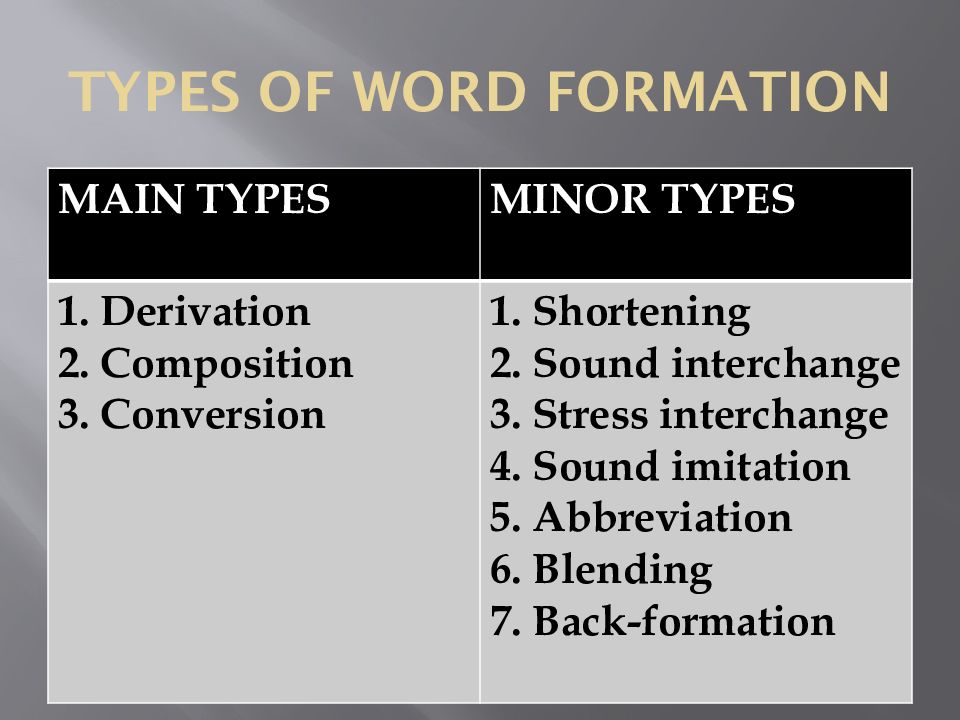Скачать материал

Скачать материал


- Сейчас обучается 43 человека из 21 региона


- Сейчас обучается 37 человек из 18 регионов


- Сейчас обучается 1387 человек из 83 регионов


Описание презентации по отдельным слайдам:
-
1 слайд
Word Formation
Кашина В.Л.,
учитель английского языка
МБОУ «СОШ №1
города Новоалтайска Алтайского края» -
2 слайд
Методическая разработка по теме «Word Formation» составлена к УМК «Spotlight — 7» авторов Ю.Е.Ваулиной, Д.Дули и др.
В первой части презентации содержится теоретическая часть по теме.
Вторая часть представляет собой опыт работы автора по формированию языковой компетенции школьником и содержит систему упражнений к УМК по теме «Word Formation» к модулям 1, 4, 6, 8, 10.
Презентация помогает систематизировать материал по словообразованию по всему курсу 7-го класса, поэтому её можно использовать как к конкретному модулю УМК, так и в конце курса для повторения способов словообразования. -
3 слайд
Цель:
обеспечить условия для систематизации знаний учащихся по теме «Словообразование» за курс 7-го класса посредством создания системы упражнений по теме. -
4 слайд
Задачи:
— ознакомить учащихся со структурой слов и с 3-мя основными способами образования слов (конверсией, словосложением и деривацией);
выработать умение правильно распознавать приставки и суффиксы различных частей речи и определять морфологический состав слов;
формировать и закреплять умение образовывать новые слова с помощью трёх основных способов словообразования и употреблять слова нужной части речи в конкретной речевой ситуации. -
5 слайд
Теоретическая часть
-
6 слайд
Словообразование в английском языке. Word Formation in English
Словарный состав английского языка находится в состоянии непрерывного изменения.
Одна из закономерностей развития словарного состава языка – пополнение его новыми словами. Пополнение это происходит путём образования новых слов – словообразования. В этом процессе проявляется связь словообразования с грамматикой, в частности с морфологией. Новые слова пишутся в соответствии с грамматикой английского языка, по образцу уже имеющихся слов в языке и относятся к определённой части речи. -
7 слайд
Слова по своей структуре в английском языке бывают:
Простые (dark, black, use);
Производные (darkness, blackness, useful, useless, user);
Сложные (dark-blue, blackberry, blackbird, black-board, black and white);
Составные (to get dark, to black out, to use up). -
8 слайд
Основные способы образования слов:
I. Conversion
II. Compounding
III. Derivation -
9 слайд
I. Conversion
is the process of using words from one word class as members of another class, changing stress, replacing syllables.
Конверсия – это процесс использования одного слова
— в разных частях речи (cost – to cost);
— изменение ударения (import – to import);
— замена глухих согласных на звонкие согласные (advice – to advise). -
10 слайд
II. Compounding
is the process of combining two words to form a new word.
Словосложение – это процесс образования нового слова из двух частей. Например: home+work=homeworkrailway, keyboard, airport, fireman
-
11 слайд
III. Derivation
or word formation process which builds new words by adding morphemes (suffixes and prefixes).
Деривация — словопроизводство новых слов различных частей речи с помощью морфем (суффиксов и префиксов). Этот способ словообразования очень распространён в английском языке. -
12 слайд
Образование слов с помощью суффиксов
Суффикс – это часть слова, которая ставится после корня. Слово с суффиксом принимает новое значение и может относиться к другой части речи. -
13 слайд
Образование существительных от глаголов:
1. С помощью суффикса –al (to approve – approval),
2. С помощью суффиксов –ance, ence (to assist – assistance),
3. С помощью суффикса –age (to marry – marriage),
4. С помощью суффикса –ant (to account – accountant),
5. С помощью суффикса –ee (to employ – employee), -
14 слайд
Образование существительных от глаголов: 6. С помощью суффиксов –er, -or (to bake – baker, to act – actor),
7. С помощью суффикса –ery (to cook – cookery),
8. С помощью суффиксов –ion, tion (to act – action, to compete – competition),
9. С помощью суффикса –ment (to develop – development),
10. С помощью суффикса –ness (to sleep – sleepiness),
11. С помощью суффикса –ure (to press – pressure),
12. С помощью суффикса – ing (to act – the acting). -
15 слайд
Образование существительных от прилагательных:
1.с помощью суффикса –dom образовываем существительные со значением состояния или владения (free – freedom),
2.с помощью суффиксов –ance, –ence (different – difference),
3.с помощью суффикса –ity (possible –possibility),
4.с помощью суффикса –ness говорим о состоянии, наличии качества (dark – darkness), -
16 слайд
Образование существительных от прилагательных:
5.с помощью суффикса –ry (brave – bravery),
6.с помощью суффикса –th (deep – depth),
7.с помощью суффиксов –ty (certain – certainty). -
17 слайд
Образование существительных от существительных:
1.с помощью суффикса –ade (block – blockade),
2.с помощью суффикса –ess (actor – actress),
3.с помощью суффиксов –ian, -an (Russia – Russian),
4.с помощью суффикса –dom (king – kingdom),
5.с помощью суффикса –ful (spoon – spoonful), -
18 слайд
Образование существительных от существительных:
6.с помощью суффикса –hood (child — childhood),
7.с помощью суффикса –ism (capital – capitalism),
8.с помощью суффикса –ist (art – artist),
9.с помощью суффикса –ship (friend – friendship),
10.с помощью суффиксов –y, -ie для образования уменьшительных или ласкательных имён (dad — daddy),
11.с помощью суффиксов –ry (slave – slavery), -
19 слайд
Образование прилагательных от глаголов:
1.с помощью суффиксов –able, -ible (to eat — eatable),
2.с помощью суффиксов –ant, -ent (to respond – respondent, to signify – significant),
3.с помощью суффикса –ed (to commit – committed),
4.с помощью суффикса –ful (to doubt – doubtful),
5.с помощью суффикса –ive (to act –active),
6.с помощью суффикса –ous (to vary –various) -
20 слайд
Образование прилагательных от существительных:
1.с помощью суффикса –able (comfort – comfortable),
2.с помощью суффикса –ary (reaction – reactionary),
3.с помощью суффиксов –ic (+ –al) (nation – national),
4.с помощью суффикса –ish (red — reddish),
5.с помощью суффикса –ive (effect – effective), -
21 слайд
Образование прилагательных от существительных:
6.с помощью суффикса –en (wood – wooden),
7.с помощью суффикса –ern (west– western),
8.с помощью суффикса –ful (colour – colourful),
9.с помощью суффикса –less (end — endless),
10.с помощью суффикса –ly (month — monthly),
11.с помощью суффикса –ous (fame — famous),
12.с помощью суффикса –y (sun — sunny). -
22 слайд
Образование глаголов от существительных:
1.с помощью суффикса –ate (alien – to alienate),
2.с помощью суффикса –en (strength – to strengthen),
3.с помощью суффикса –ize (computer – to computerize),
4.с помощью суффикса –(i)fy (gas – to gasify), -
23 слайд
Образование глаголов от прилагательных:
1.с помощью суффикса –en (sweet– to sweeten),
2.с помощью суффикса –ize (emotional – to emotionalize),
3.с помощью суффикса –ify (simple – to simplify), -
24 слайд
Образование наречий от прилагательных:
С помощью суффикса – ly (sad – sadly), если прилагательное оканчивается на – y, то – y меняется на – i перед суффиксом – ly.
Наречия и прилагательные могут совпадать по форме. Например:
Far — далёкий, далеко;
Near – близкий, близко;
Fast – быстрый, быстро;
Late – поздний, поздно;
Little – маленький, мало;
Hard – твёрдый, твёрдо.
Наречие с суффиксом – ly может иметь другое значение: hardly – едва, lately – недавно, nearly – почти, приблизительно.
С помощью суффикса -ward(s) образование прилагательных или наречий со значением направления, обозначенного исходным словом (back – backward),
С помощью суффикса –wise (clock – clockwise). -
25 слайд
Образование числительных с помощью суффиксов
С помощью суффикса –th от количественных числительных образуем порядковые числительные (four – fourth),2. С помощью
суффикса –teen от количественных числительных образуем количественные числительные (four – fourteen),
С помощью суффикса –ty от количественных числительных образуем количественные числительные (four – forty), -
26 слайд
Образование слов при помощи префикса
Префикс – это часть слова, которая ставится перед корнем. Слово с префиксом принимает новое значение.
Наиболее употребительные префиксы и их значения
1.Префикс a- для образования слов категории состояния (to sleep –asleep),
2.Префикс anti– в значение анти-, противо- (fascist – antifascist),
3.Префикс be- в значение кругом, вокруг, полностью, целиком (cloud – to becloud), -
27 слайд
Образование слов при помощи префикса
4.Префикс bi- в значение двойной, два, дважды (lingual – bilingual),
5.Префикс co– передающий общность, совместность действия (to exist – to coexist),
6.Префикс counter- в значение противо-, контр- (to act – to counteract),
7.Префикс en– в значение приведения в какое-то состояние или включения внутрь чего-либо (rich – to enrich, cage – to encage),
8.Префикс ex– в значение изъять, исключить или бывший, прежний, экс-: (champion – ex-champion), -
28 слайд
Образование слов при помощи префикса
9.Префикс extra– в значение сверх-, особо-, вне-, экстра- (ordinary – extraordinary),
На экран проецируется 14 слайд.
10.Префикс fore– в значение перед-, пред- (see – foresee),
11.Префикс inter– в значение меж-, между-, среди (national – international),
12.Префикс out– для глаголов со значением вы-, пере- и для существительных и прилагательных со значением выхода, проявления, отдалённости вне- (to cry – to outcry, door — outdoor), -
29 слайд
Образование слов при помощи префикса
13.Префикс over– в значение сверх-, над-, пере-, чрезмерно, слишком (act – overact),
14.Префикс post– в значение после- (war – postwar),
15.Префикс pre– в значение до-, пред-, заранее (historic – prehistoric),
16.Префикс re– в значение снова, заново, ещё раз (to read – to reread),
17.Префикс semi- в значение полу- (final – semifinal),
18.Префикс sub– указывает на положение ниже или под чем-либо, в значение под- (division – subdivision),
19.Префикс super– в значение сверх-, над- (man – superman), -
30 слайд
Приставки с отрицательным значением
1.Префиксы a–, ab- в значение без-, не- (moral – amoral),
2.Приставка dis- придаёт значение отсутствия чего-то, не-, дис- или дез- (order – disorder, to organize – to disorganize).
3.Приставка in- придаёт противоположное значение без-, не- (active – inactive).
4.Приставка il- (перед I) придаёт противоположное значение не- (legal – illegal).
5.Приставка im- (перед p, m) придаёт противоположное значение не- (polite – impolite, mobile — immobile). -
31 слайд
Приставки с отрицательным значением
6.Приставка ir- (перед r) придаёт противоположное значение не- (responsible – irresponsible).
7.Приставка mis- придаёт значение неправильно, плохо, не- (use – misuse).
8.Приставка non- означает отрицание или отсутствие, не- (existent – nonexistent).
9.Приставка un- придаёт противоположное значение не- (happy – unhappy).
10.Приставка under- придаёт противоположное значение не-, недо-, под- (production – underproduction). -
32 слайд
Тема «Словообразование»
в УМК «Spotlight-7»
(Система упражнений) -
33 слайд
Модуль 1, №3, с.8
Read the rule: We form adverbs from adjectives by adding – ly
Read and compare: -
34 слайд
Модуль 1, №3, с.8
3. Find and read out the sentences with adverbs in exercises 1 and 2, p. 8
Keys: properly, really, probably
4. Form adverbs:5. Make sentences using these adverbs.
-
35 слайд
Модуль 4, №5, с.42
Read the rule: We can use -able, -ble, -ent to form adjectives from verbs.
Read and compare:3. Translate. Make sentences with these words.
-
36 слайд
Модуль 6, №5, с. 61
1. Read the rule: we use un-, il-, im-, in-, ir- to form opposite adjectives.
2. Read and compare:3. Find and read out the sentence with such adjective in the article.
4. Form opposite adjectives: № 5, p. 61 -
37 слайд
Модуль 8, №4, с. 82
Read the rule: we use –en at the end of some adjectives to form verbs.
Read and compare:Form verbs from the adjectives: № 4, p. 82
Make the sentences with these words. -
38 слайд
Модуль 10, №5, с. 101
1.Read the rule: we use –ive, -ative to form adjectives from some verbs.
2. Read and compare:3. Form adjectives from verbs 1-7. Make sentences using them.
-
39 слайд
Ресурсы
Словообразование в английском языке. Word Formation in English
http://ped-kopilka.ru/blogs/olga-ivanovna-kabanova/slovobrazovanie-v-angliiskom-jazyke-word-formation-in-english.html
Английский язык. 7 класс: учеб. для общеобразоват. организаций/[ Ю.Е.Ваулина, Д.Дули, О.Е.Подоляко, В.Эванс]. – 9 –е изд. – М.: Express Publishing: Просвещение, 2018. – 152 стр.: (Английский в фокусе). – ISBN 978-5-09-054976-9
Краткое описание документа:
Методическая разработка по теме «Word Formation» составлена к УМК «Spotlight — 7» авторов Ю. Е. Ваулиной, Д. Дули и др.
В первой части презентации содержится теоретическая часть по теме. Её можно использовать в 5-11-х классах.
Вторая часть представляет собой опыт работы автора по формированию языковой компетенции школьником и содержит систему упражнений к УМК «Spotlight — 7» по теме «Word Formation» к модулям 1, 4, 6, 8, 10.
Презентация помогает систематизировать материал по словообразованию по всему курсу 7-го класса, поэтому её можно использовать как к конкретному модулю УМК, так и в конце курса для повторения способов словообразования в английском языке.
Найдите материал к любому уроку, указав свой предмет (категорию), класс, учебник и тему:
6 210 143 материала в базе
- Выберите категорию:
- Выберите учебник и тему
- Выберите класс:
-
Тип материала:
-
Все материалы
-
Статьи
-
Научные работы
-
Видеоуроки
-
Презентации
-
Конспекты
-
Тесты
-
Рабочие программы
-
Другие методич. материалы
-
Найти материалы
Материал подходит для УМК
Другие материалы


Рейтинг:
5 из 5
- 14.01.2019
- 785
- 0

- 14.01.2019
- 1859
- 18



- 13.01.2019
- 2017
- 113

Рейтинг:
3 из 5
- 13.01.2019
- 1632
- 0

Вам будут интересны эти курсы:
-
Курс повышения квалификации «Методика написания учебной и научно-исследовательской работы в школе (доклад, реферат, эссе, статья) в процессе реализации метапредметных задач ФГОС ОО»
-
Курс профессиональной переподготовки «Клиническая психология: организация реабилитационной работы в социальной сфере»
-
Курс повышения квалификации «Организация практики студентов в соответствии с требованиями ФГОС технических направлений подготовки»
-
Курс профессиональной переподготовки «Теория и методика преподавания иностранных языков: английский, немецкий, французский»
-
Курс профессиональной переподготовки «Теория и методика преподавания иностранных языков в профессиональном образовании: английский, немецкий, французский»
-
Курс повышения квалификации «Психодинамический подход в консультировании»
-
Курс профессиональной переподготовки «Организация деятельности секретаря руководителя со знанием английского языка»
-
Курс профессиональной переподготовки «Управление информационной средой на основе инноваций»
-
Курс профессиональной переподготовки «Организация деятельности специалиста оценщика-эксперта по оценке имущества»
-
Курс профессиональной переподготовки «Гостиничный менеджмент: организация управления текущей деятельностью»
-
Курс профессиональной переподготовки «Организация маркетинговой деятельности»
-
Курс профессиональной переподготовки «Гражданско-правовые дисциплины: теория и методика преподавания в образовательной организации»
1. English Word Formation
Deny A. Kwary http://www.kwary.net
Airlanga University
2. Types of Word Formation
1.
2.
3.
4.
5.
6.
7.
8.
9.
10.
11.
Compounding
Prefixation
Suffixation
Conversion
Clipping
Blends
Backformation
Acronyms
Onomatopoeia
Eponyms
Toponyms
3. 1. Compounding
Definition: Two or more words joined together to
form a new word.
Examples:
Home + work homework
Pick + pocket pickpocket
The meaning of a compound is not always the
sum of the meanings of its parts.
Types of compounds:
Compound nouns
Compound verbs
Compound adjectives
4.
Compound Nouns
1. Boyfriend, hatchback
1. Noun + Noun
2. Cut-throat, breakfast
2. Verb + Noun
3. Sunshine, birth control
3. Noun + Verb
4. Software, fast food
4. Adjective + Noun
5. In-crowd, overkill
5. Particle + Noun
6. Drop-out, put-on
6. Verb + Particle
5.
Compound Verbs
1. Carbon-copy, sky-dive
1. Noun + Verb
2. Fine-tune
2. Adjective + Verb
3. Overbook
3. Particle + Verb
4. Bad-mouth
4. Adjective + Noun
6.
Compound Adjectives
1. Capital-intensive
1. Noun + Adjective
2. Deaf-mute
2. Adjective + Adjective
3. Coffee-table
3. Noun + Noun
4. Roll-neck
4. Verb + Noun
5. White-collar
5. Adjective + Noun
6. Before-tax
6. Particle + Noun
7. Go-go
7. Verb-verb
7. 2. Prefixation
Class-changing prefixes:
abeen-
asleep
bewitch
enslave
V to Adj
N to V
N to V
Class-maintaining prefixes:
inforeEtc.
indefinite
foreman
Adj to Adj
N to N
8. 3. Suffixation
Suffixes forming Nouns
N from N: -dom kingdom
N from V: -ee employee
N from Adj: -ce dependence
Suffixes forming Verbs
V from N: -ify beautify
V from Adj: -en shorten
Suffixes forming adjectives
Adj from N: -al educational
Adj from V: -able understandable
Adj from Adj: -ish greenish
Suffixes forming Adverbs: -ly, -ward, and –wise.
9. 4. Conversion
Definition: Assigning an already existing word
to a new syntactic category.
Types of Conversion
Verb to Noun: to hit a hit
Adj to N: a final game a final
N to V: a sign to sign
Adj to V: an empty box to empty
10. 5. Clipping
Definition: Shortening a polysyllabic word by
deleting one or more syllables
Examples:
Gasoline Gas
Hamburger Burger
delicatessen
deli
microphone mike
11. 6. Blends
Definition: Similar to compounds, but
parts of the words are deleted.
Examples:
Motor + hotel Motel
Breakfast + lunch Brunch
Wireless + Fidelity Wi-fi
Sheep + goat Shoat
12. 7. Back-formations
Definition: Creative reduction due to incorrect
morphological analysis.
Examples:
editor (1649)
edit (1791)
television (1907)
televise (1927)
Paramedical (1921)
paramedic (1967)
13. 8. Acronyms
Definition: Words derived from the initial letters of
several words and use them as a new word
Examples:
Strengths, Weaknesses, Opportunities and Treats
SWOT
Self-contained underwater breathing apparatus
SCUBA
14. 9. Onomatopoeia
Definition: Words created to sound like the thing
that they name.
English
Japanese
Tagalog
Indonesian
Cock-a-doo
Kokekokko
Kuk-kakauk
Kukuruyuk
Meow
Nya
Niyaw
Meong
15. 10. Eponyms
Definition: a person after whom a
discovery, invention, place, etc., is
named.
Examples:
Celcius (Anders Celcius)
Cook Islands (James Cook)
16. 11. Toponyms
Definition: a place name, especially one
derived from a topographical feature.
Examples:
Montana (‘mountains’ in Spanish)
Mississippi (‘big river’ in Chippewa)
17.
Deny A. Kwary
http://www.kwary.net
Airlanga University
Слайд 1
Word formation 8-11
Слайд 2
Основные суффиксы прилагательных: Суффикс, обозначающий национальную принадлежность или слабую степень качества: — ese — ish Chinese ( китаец, китайский), Japanese ( японец, японский) Pole ( поляк) — Polish ( польский), Scott ( шотландец) — Scottish ( шотландский) red ( красный) — reddish ( красноватый), child ( ребенок) — childish ( ребячливый, детский)
Слайд 3
Суффиксы, образующие прилагательные от глаголов и обозначающие наличие качества: — ive – ent -ant to act ( действовать) — active ( активный), to talk ( разговаривать) – talkative ( разговорчивый) to differ ( различать) — different ( различный), to insist ( настаивать) — insistent ( настойчивый) to observe ( наблюдать, замечать) — observant ( наблюдательный, внимательный)
Слайд 4
Суффиксы, образующие прилагательные от существительных и обозначающие наличие качества, свойства: — ic -al — ful — ous — у base ( основа) — basic ( основной), economy ( экономика) — economic ( экономический) centre ( центр) — central ( центральный) culture ( культура) — cultural ( культурный), beauty ( красота) — beautiful ( красивый) peace ( мир) — peaceful ( мирный), fame ( слава) — famous ( знаменитый) cloud ( облако) — cloudy ( облачный), sun ( солнце) — sunny ( солнечный)
Слайд 5
Суффиксы, образующие прилагательные от различных частей речи и обозначающие а) качество, свойство: -а r у — огу element ( элемент) — elementary ( элементарный) illusion ( иллюзия) — illusory ( обманчивый, иллюзорный) б) способность что-либо сделать, состояние, качество: — able — ible to change ( изменить) — changeable ( изменчивый) to eat ( есть) — eatable ( съедобный), reason ( разум) — reasonable ( разумный) в) отсутствие качества : — less useless ( бесполезный), windless ( безветренный)
Слайд 6
суффиксы существительных и прилагательных Существительные: — ness, -ion, — ation , — ment , — ance , — ition Прилагательные: — al, -y, — ly , — ful , — ous , — tific 1) Прилагательное Существительное 1. luck y ( удачный) luck ( удача) 2. …… happiness ( счастье) 3. wonderful ( чудесный) …… 4. …… speed ( скорость) 5. greedy ( жадный) …… 6. …… friend ( друг) 7. …… danger ( опасность) 8. traditional ( традиционный) …… 9. …… science ( наука) 10. ill ( больной) …… 11. …… truth ( правда) 12. …… profession ( профессия) 13. …… business ( бизнес) 14. healthy ( здоровый) …… 15. …… wealth ( богатство)
Слайд 7
lucky ( удачный) scientific ( научный) happy ( счастливый) illness ( болезнь) wonder ( чудо) truthful ( правдивый) speedy ( скоростной) professional greed ( жадность) busy ( деловой) friendly ( дружелюбный) health ( здоровье) dangerous ( опасный) wealthy ( богатый) tradition ( традиция)
Слайд 8
Образуйте прилагательные с помощью суффиксов — ful и — less , переведите их на русский язык: Beauty, thank, hope, doubt, care, aim, use, shape, fruit, power, thought, harm, colour .
Слайд 9
Образуйте прилагательные с помощью суффиксов — able, — ible , переведите их на русский язык: Change, convert, prevent, break, compare, desire, profit, read, comfort, respect, expect.
Слайд 10
Найдите и выделите суффиксы в данных словах и определите, к какой части речи эти слова относятся: British, foolish, understandable, heartless, pitiless, successful, experiment, function, musician, socialist, artist, capitalism, professional, fundamental, industrial, doubtful, useful, different, treatment, creative, attractive, peaceful, dangerous, elementary, childish, active, economic, director, worker, passage, marriage, silence, freedom, kingdom.
Слайд 11
Заполните предложения прилагательными , образованными от существительных , данных в скобках, при помощи суффиксов – ful ,- ly ,-y 1. You must be…………………when you open the door. (CARE) 2. The countryside looks very………………….now. (COLOUR) 3. That was a very………………thing to do! (COWARD) 4. He has a…………………routine of exercises. (DAY) 5. She was…………………when I told her my plan. (DOUBT) 6. It was very………………..so I drove slowly. (FOG) 7. It’s nice meeting such a……………….person. (FRIEND) 8. He looked very…………………in that hat. (FUN) 9. They saw a…………………figure at the castle door. (GHOST) 10. Working on the car made her hands………………… (GREASE) 11. Let’s go for a………………walk in the fresh air! (HEALTH) 12. We’re………………….that they’ll agree to come. (HOPE) 13. Seeing all that food made me very……………….. (HUNGER) 14. She married a………………..businessman. (SUCCESS) 15. He looked…………………..when he heard the news. (THOUGHT) 16. You can trust her. She’s a very…………………girl. (TRUTH) 17. This map was very………………..on my holiday. (USE) 18. It was…………………to see him again. ( WONDER )
Слайд 1Word Formation
Кашина В.Л.,
учитель английского языка
МБОУ «СОШ №1
города Новоалтайска Алтайского
края»
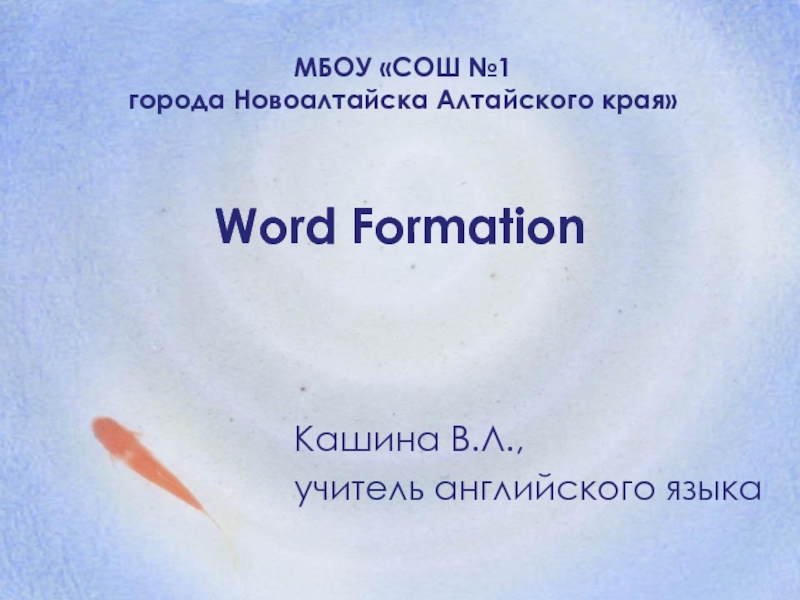
Слайд 2Методическая разработка по теме «Word Formation» составлена к УМК «Spotlight —
7» авторов Ю.Е.Ваулиной, Д.Дули и др.
В первой части презентации содержится теоретическая часть по теме.
Вторая часть представляет собой опыт работы автора по формированию языковой компетенции школьником и содержит систему упражнений к УМК по теме «Word Formation» к модулям 1, 4, 6, 8, 10.
Презентация помогает систематизировать материал по словообразованию по всему курсу 7-го класса, поэтому её можно использовать как к конкретному модулю УМК, так и в конце курса для повторения способов словообразования.
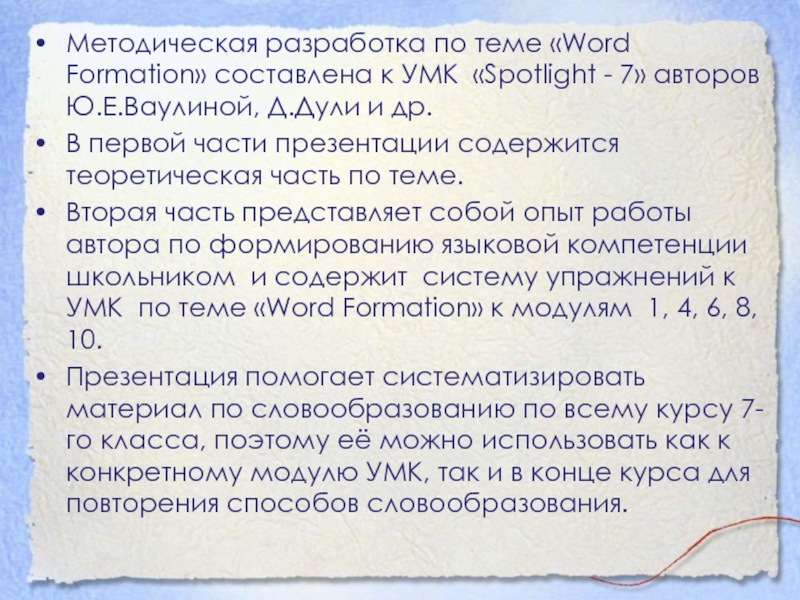
Слайд 3Цель:
обеспечить условия для систематизации знаний учащихся по теме «Словообразование» за курс
7-го класса посредством создания системы упражнений по теме.
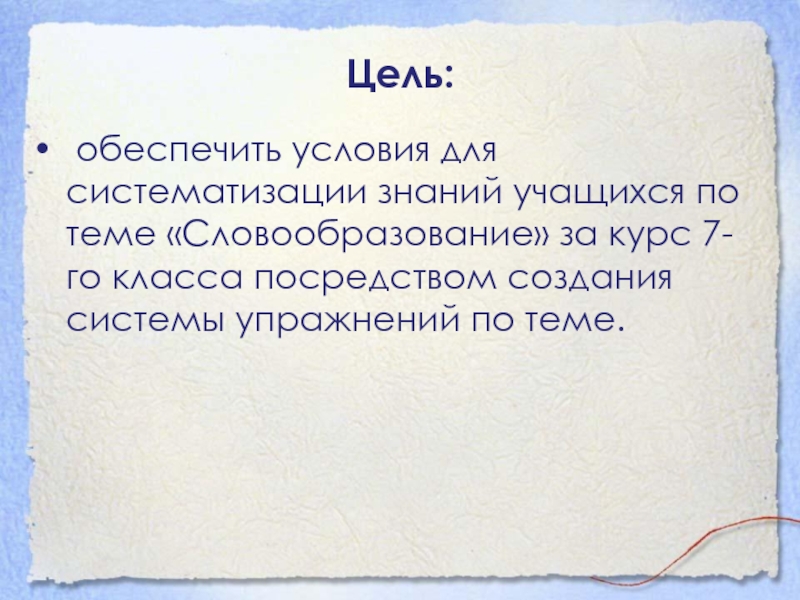
Слайд 4Задачи:
— ознакомить учащихся со структурой слов и с 3-мя основными способами
образования слов (конверсией, словосложением и деривацией);
выработать умение правильно распознавать приставки и суффиксы различных частей речи и определять морфологический состав слов;
формировать и закреплять умение образовывать новые слова с помощью трёх основных способов словообразования и употреблять слова нужной части речи в конкретной речевой ситуации.
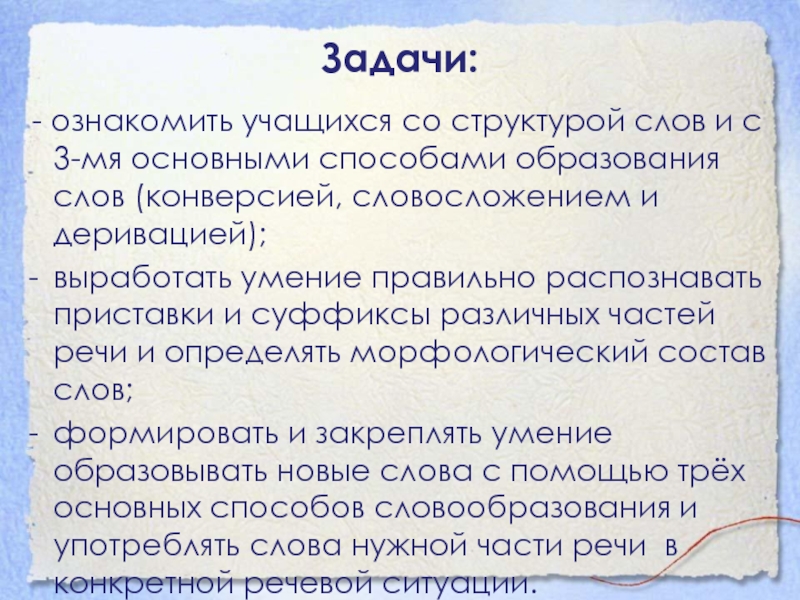
Слайд 6Словообразование в английском языке. Word Formation in English
Словарный состав английского языка
находится в состоянии непрерывного изменения.
Одна из закономерностей развития словарного состава языка – пополнение его новыми словами. Пополнение это происходит путём образования новых слов – словообразования. В этом процессе проявляется связь словообразования с грамматикой, в частности с морфологией. Новые слова пишутся в соответствии с грамматикой английского языка, по образцу уже имеющихся слов в языке и относятся к определённой части речи.
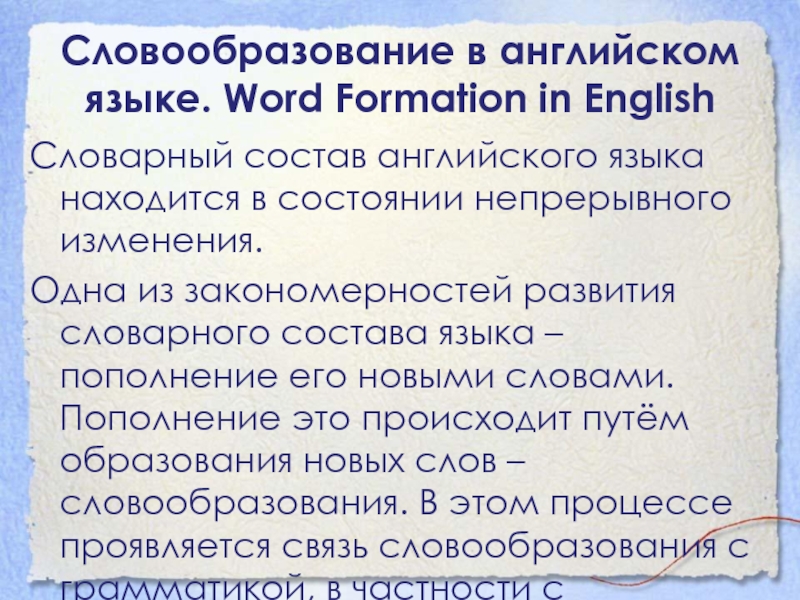
Слайд 7Слова по своей структуре в английском языке бывают:
Простые (dark, black, use);
Производные (darkness, blackness,
useful, useless, user);
Сложные (dark-blue, blackberry, blackbird, black-board, black and white);
Составные (to get dark, to black out, to use up).
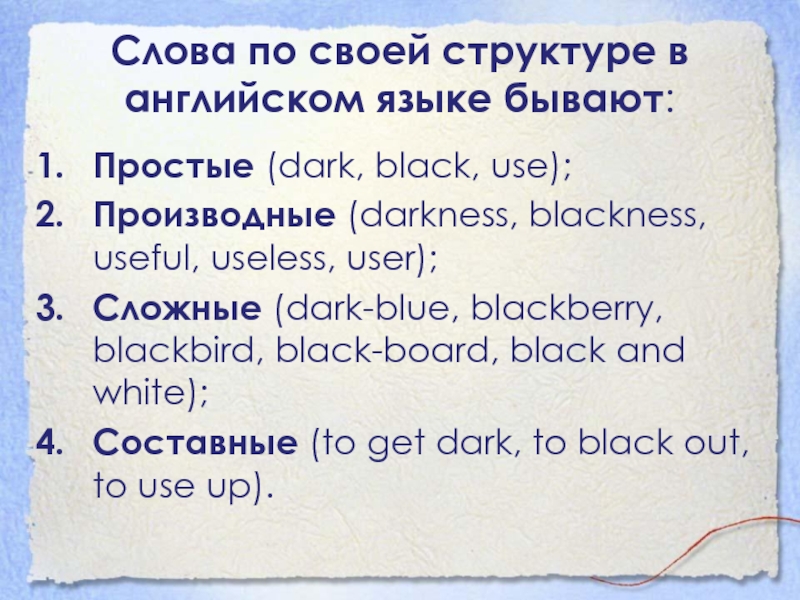
Слайд 8Основные способы образования слов:
I. Conversion
II. Compounding
III. Derivation
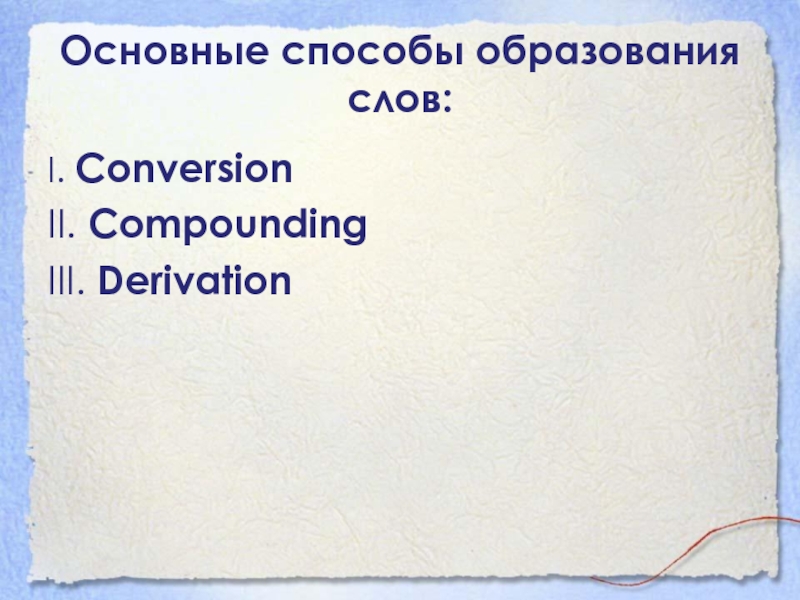
Слайд 9I. Conversion
is the process of using words from one word class as
members of another class, changing stress, replacing syllables.
Конверсия – это процесс использования одного слова
— в разных частях речи (cost – to cost);
— изменение ударения (import – to import);
— замена глухих согласных на звонкие согласные (advice – to advise).
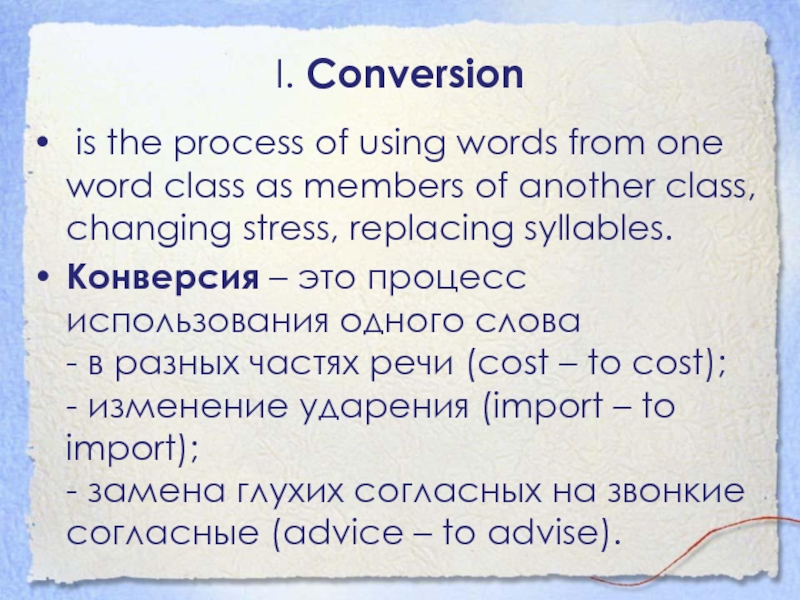
Слайд 10II. Compounding
is the process of combining two words to form a new
word.
Словосложение – это процесс образования нового слова из двух частей. Например: home+work=homework
railway, keyboard, airport, fireman
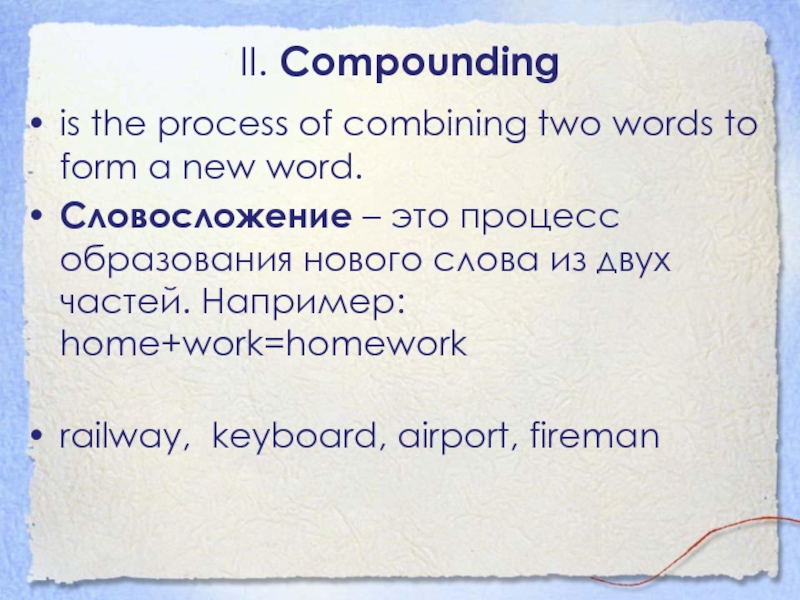
Слайд 11III. Derivation
or word formation process which builds new words by adding morphemes
(suffixes and prefixes).
Деривация — словопроизводство новых слов различных частей речи с помощью морфем (суффиксов и префиксов). Этот способ словообразования очень распространён в английском языке.
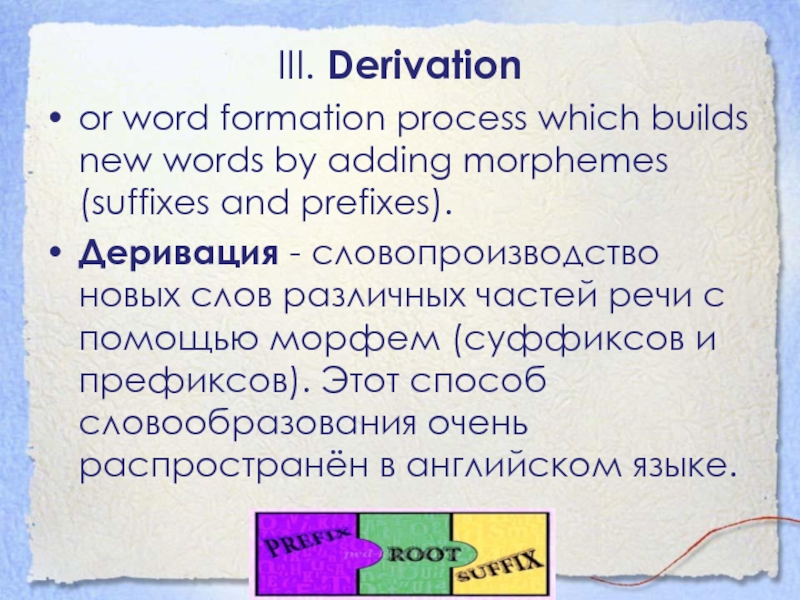
Слайд 12Образование слов с помощью суффиксов
Суффикс – это часть слова, которая ставится после
корня. Слово с суффиксом принимает новое значение и может относиться к другой части речи.
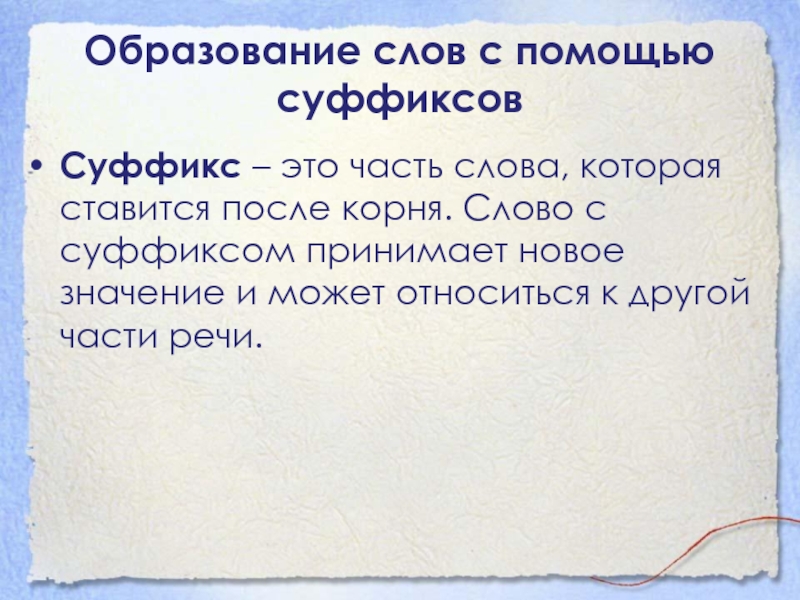
Слайд 13Образование существительных от глаголов:
1. С помощью суффикса –al (to approve – approval),
2. С
помощью суффиксов –ance, ence (to assist – assistance),
3. С помощью суффикса –age (to marry – marriage),
4. С помощью суффикса –ant (to account – accountant),
5. С помощью суффикса –ee (to employ – employee),
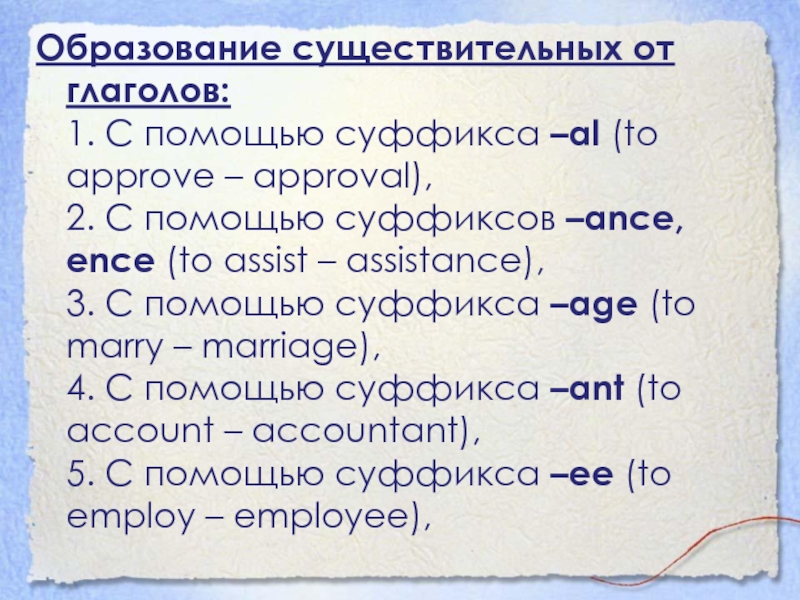
Слайд 14Образование существительных от глаголов: 6. С помощью суффиксов –er, -or (to bake –
baker, to act – actor),
7. С помощью суффикса –ery (to cook – cookery),
8. С помощью суффиксов –ion, tion (to act – action, to compete – competition),
9. С помощью суффикса –ment (to develop – development),
10. С помощью суффикса –ness (to sleep – sleepiness),
11. С помощью суффикса –ure (to press – pressure),
12. С помощью суффикса – ing (to act – the acting).
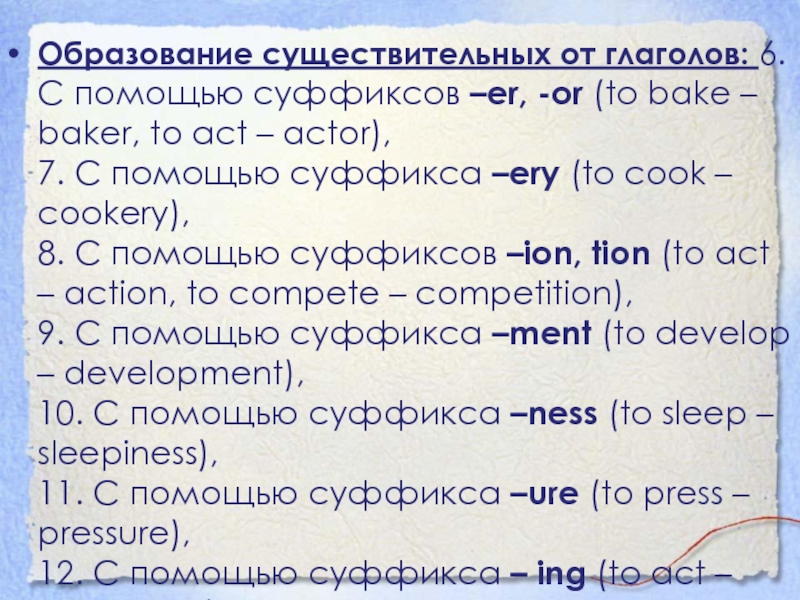
Слайд 15Образование существительных от прилагательных:
1.с помощью суффикса –dom образовываем существительные со значением состояния или
владения (free – freedom),
2.с помощью суффиксов –ance, –ence (different – difference),
3.с помощью суффикса –ity (possible –possibility),
4.с помощью суффикса –ness говорим о состоянии, наличии качества (dark – darkness),
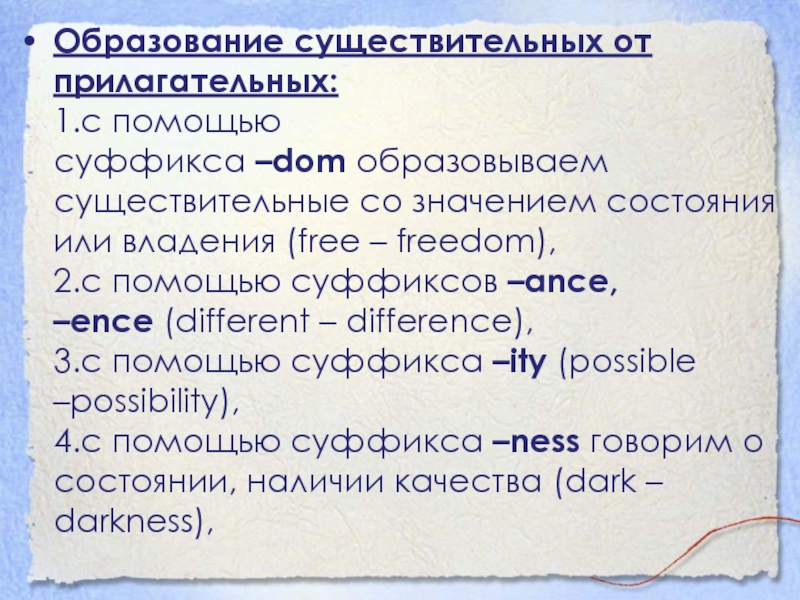
Слайд 16Образование существительных от прилагательных:
5.с помощью суффикса –ry (brave – bravery),
6.с помощью суффикса –th (deep –
depth),
7.с помощью суффиксов –ty (certain – certainty).
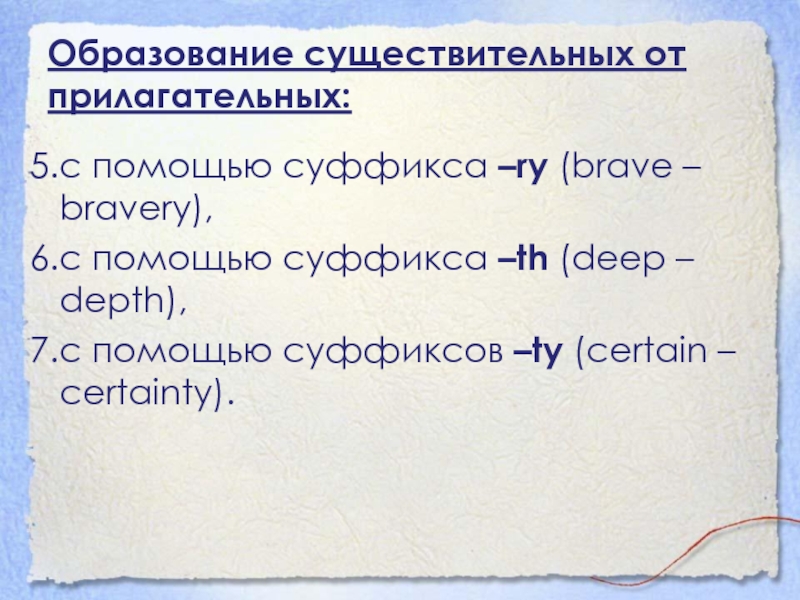
Слайд 17Образование существительных от существительных:
1.с помощью суффикса –ade (block – blockade),
2.с помощью суффикса –ess (actor –
actress),
3.с помощью суффиксов –ian, -an (Russia – Russian),
4.с помощью суффикса –dom (king – kingdom),
5.с помощью суффикса –ful (spoon – spoonful),
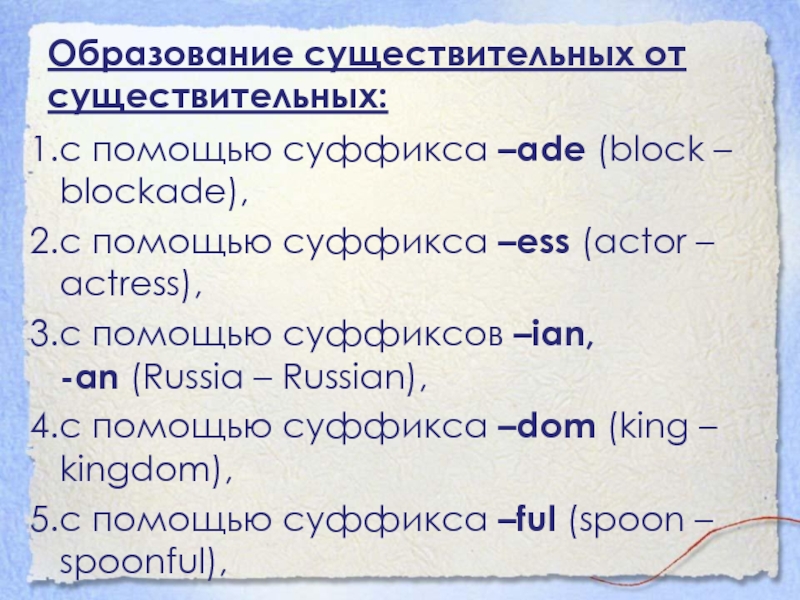
Слайд 18Образование существительных от существительных:
6.с помощью суффикса –hood (child — childhood),
7.с помощью суффикса –ism (capital –
capitalism),
8.с помощью суффикса –ist (art – artist),
9.с помощью суффикса –ship (friend – friendship),
10.с помощью суффиксов –y, -ie для образования уменьшительных или ласкательных имён (dad — daddy),
11.с помощью суффиксов –ry (slave – slavery),
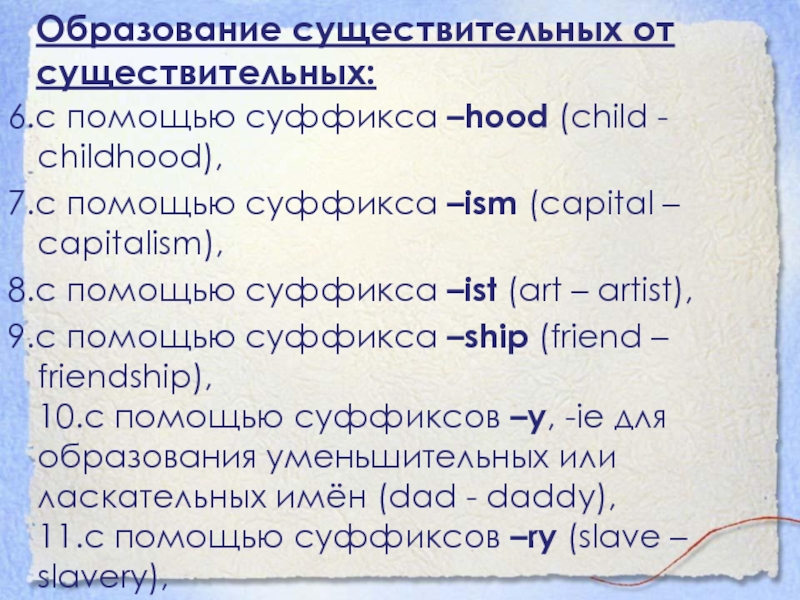
Слайд 19Образование прилагательных от глаголов:
1.с помощью суффиксов –able, -ible (to eat — eatable),
2.с помощью
суффиксов –ant, -ent (to respond – respondent, to signify – significant),
3.с помощью суффикса –ed (to commit – committed),
4.с помощью суффикса –ful (to doubt – doubtful),
5.с помощью суффикса –ive (to act –active),
6.с помощью суффикса –ous (to vary –various)
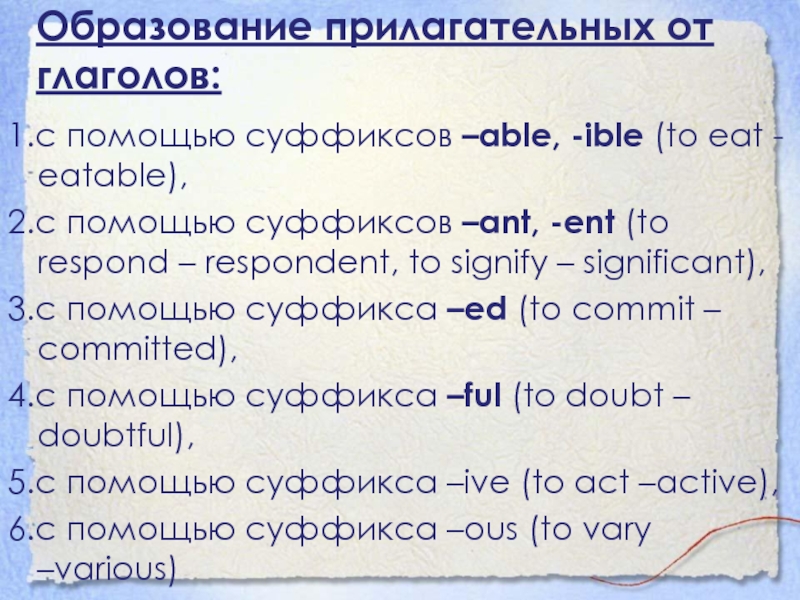
Слайд 20Образование прилагательных от существительных:
1.с помощью суффикса –able (comfort – comfortable),
2.с помощью суффикса –ary (reaction –
reactionary),
3.с помощью суффиксов –ic (+ –al) (nation – national),
4.с помощью суффикса –ish (red — reddish),
5.с помощью суффикса –ive (effect – effective),
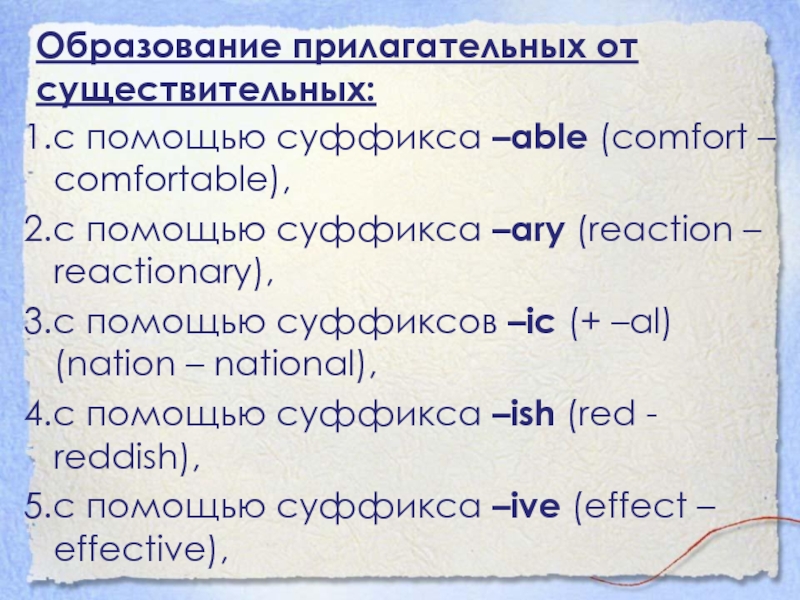
Слайд 21Образование прилагательных от существительных:
6.с помощью суффикса –en (wood – wooden),
7.с помощью суффикса –ern (west– western),
8.с
помощью суффикса –ful (colour – colourful),
9.с помощью суффикса –less (end — endless),
10.с помощью суффикса –ly (month — monthly),
11.с помощью суффикса –ous (fame — famous),
12.с помощью суффикса –y (sun — sunny).
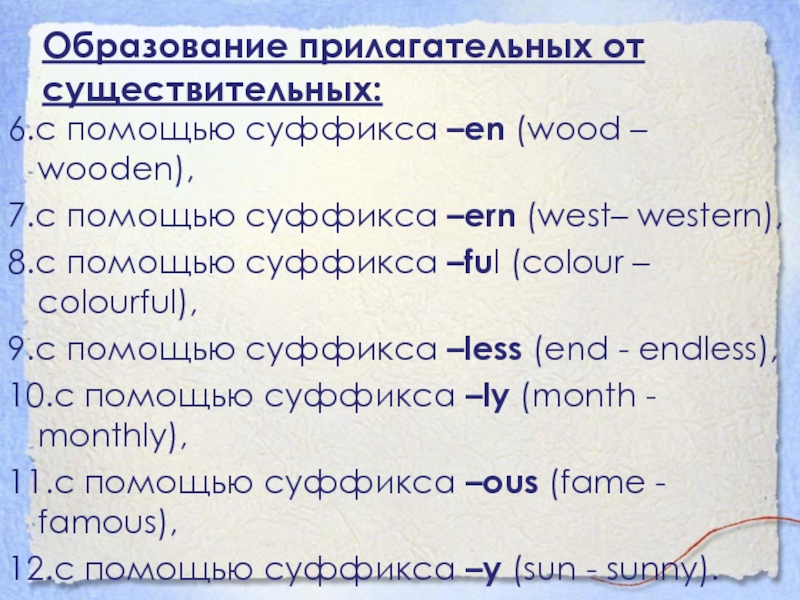
Слайд 22Образование глаголов от существительных:
1.с помощью суффикса –ate (alien – to alienate),
2.с помощью суффикса –en (strength
– to strengthen),
3.с помощью суффикса –ize (computer – to computerize),
4.с помощью суффикса –(i)fy (gas – to gasify),
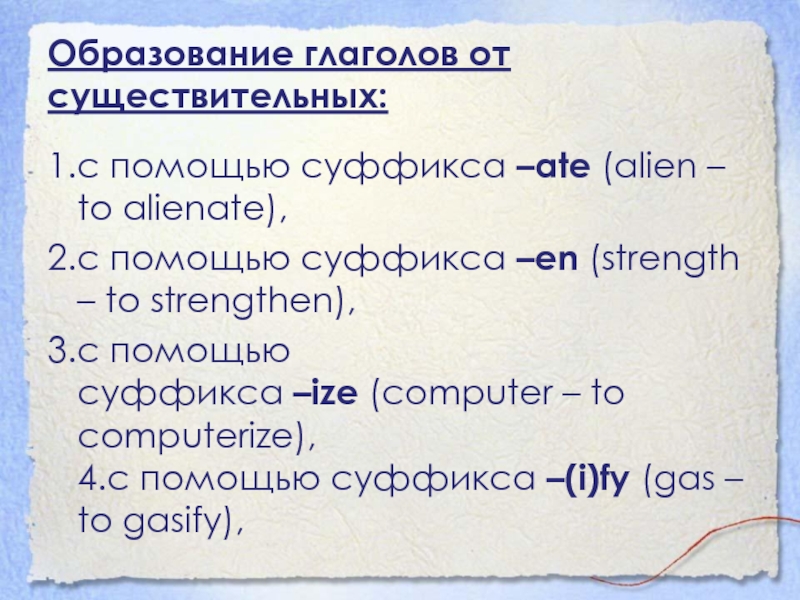
Слайд 23Образование глаголов от прилагательных:
1.с помощью суффикса –en (sweet– to sweeten),
2.с помощью суффикса –ize (emotional –
to emotionalize),
3.с помощью суффикса –ify (simple – to simplify),
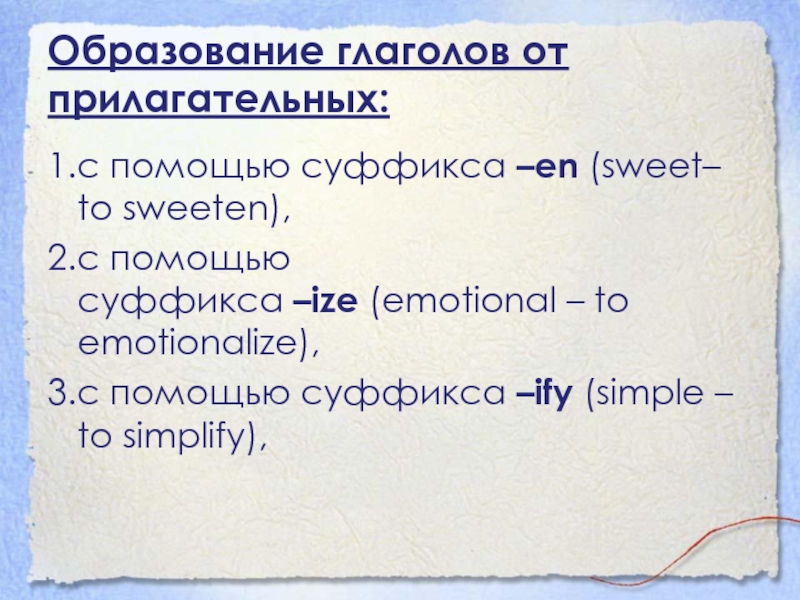
Слайд 24Образование наречий от прилагательных:
С помощью суффикса – ly (sad – sadly), если прилагательное
оканчивается на – y, то – y меняется на – i перед суффиксом – ly.
Наречия и прилагательные могут совпадать по форме. Например:
Far — далёкий, далеко;
Near – близкий, близко;
Fast – быстрый, быстро;
Late – поздний, поздно;
Little – маленький, мало;
Hard – твёрдый, твёрдо.
Наречие с суффиксом – ly может иметь другое значение: hardly – едва, lately – недавно, nearly – почти, приблизительно.
С помощью суффикса -ward(s) образование прилагательных или наречий со значением направления, обозначенного исходным словом (back – backward),
С помощью суффикса –wise (clock – clockwise).
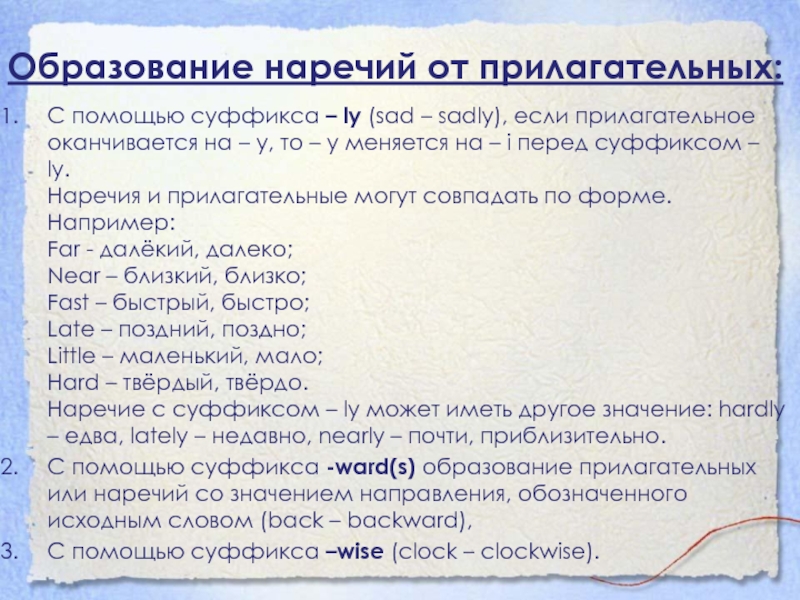
Слайд 25Образование числительных с помощью суффиксов
С помощью суффикса –th от количественных числительных образуем порядковые
числительные (four – fourth),2. С помощью
суффикса –teen от количественных числительных образуем количественные числительные (four – fourteen),
С помощью суффикса –ty от количественных числительных образуем количественные числительные (four – forty),
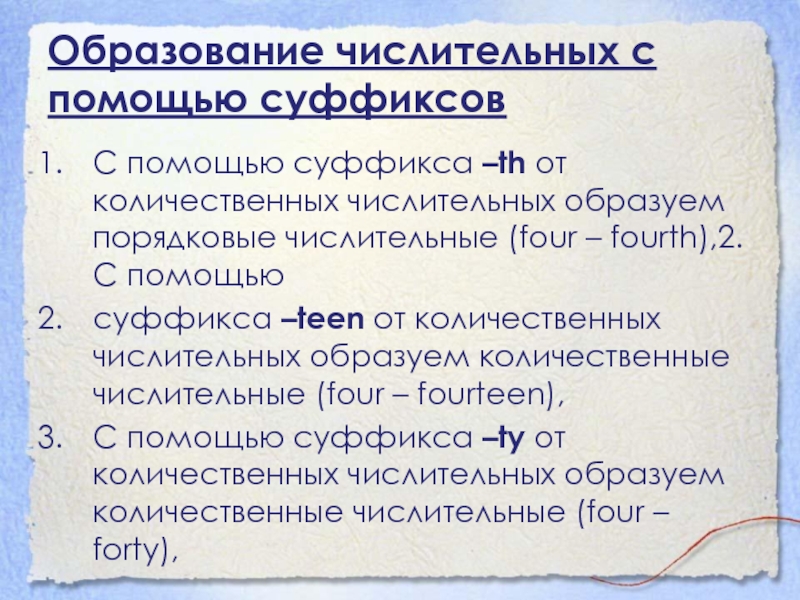
Слайд 26Образование слов при помощи префикса
Префикс – это часть слова, которая ставится перед
корнем. Слово с префиксом принимает новое значение.
Наиболее употребительные префиксы и их значения
1.Префикс a- для образования слов категории состояния (to sleep –asleep),
2.Префикс anti– в значение анти-, противо- (fascist – antifascist),
3.Префикс be- в значение кругом, вокруг, полностью, целиком (cloud – to becloud),
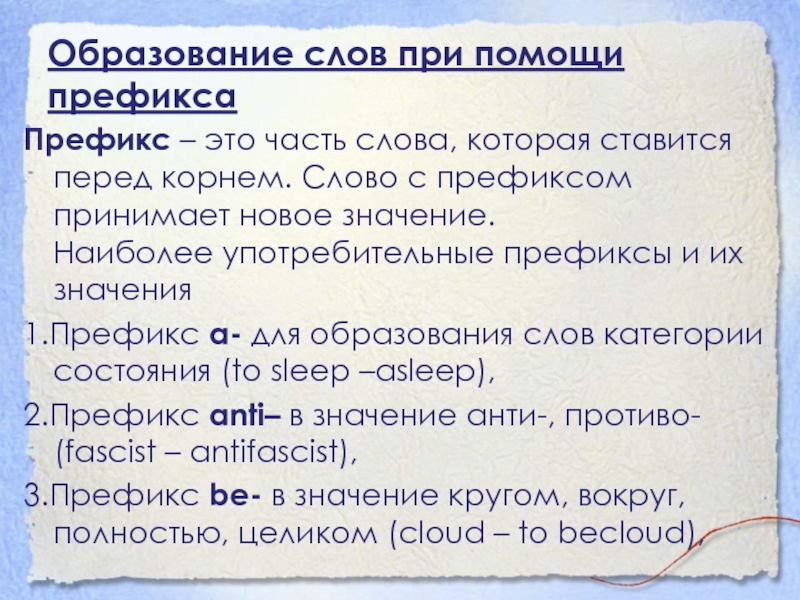
Слайд 27Образование слов при помощи префикса
4.Префикс bi- в значение двойной, два, дважды (lingual –
bilingual),
5.Префикс co– передающий общность, совместность действия (to exist – to coexist),
6.Префикс counter- в значение противо-, контр- (to act – to counteract),
7.Префикс en– в значение приведения в какое-то состояние или включения внутрь чего-либо (rich – to enrich, cage – to encage),
8.Префикс ex– в значение изъять, исключить или бывший, прежний, экс-: (champion – ex-champion),
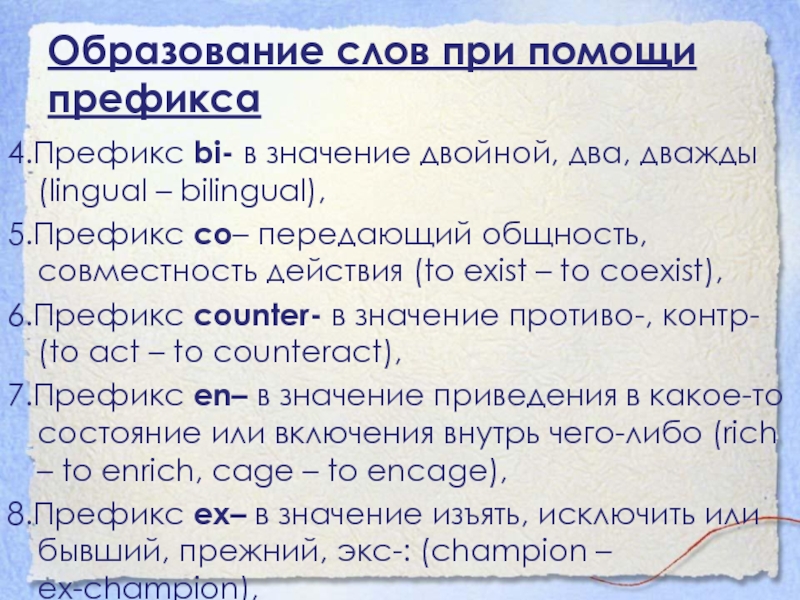
Слайд 28Образование слов при помощи префикса
9.Префикс extra– в значение сверх-, особо-, вне-, экстра-
(ordinary – extraordinary),
На экран проецируется 14 слайд.
10.Префикс fore– в значение перед-, пред- (see – foresee),
11.Префикс inter– в значение меж-, между-, среди (national – international),
12.Префикс out– для глаголов со значением вы-, пере- и для существительных и прилагательных со значением выхода, проявления, отдалённости вне- (to cry – to outcry, door — outdoor),
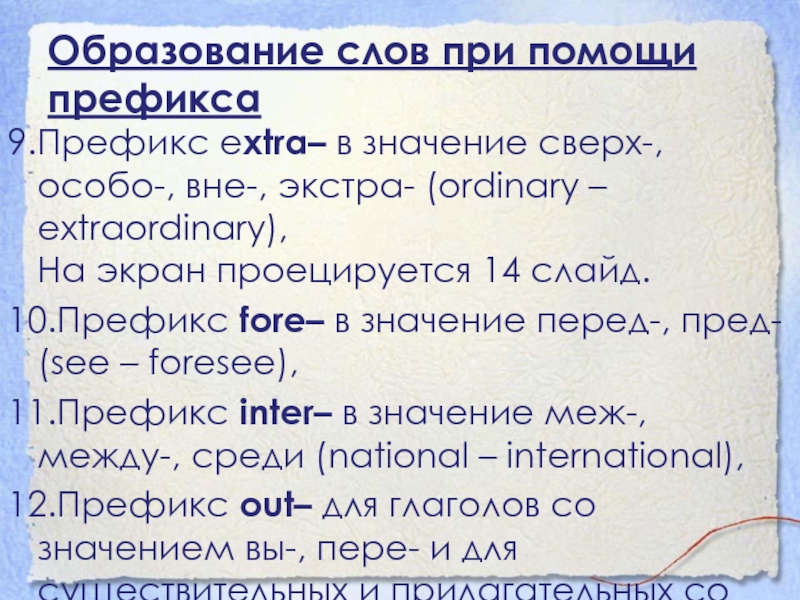
Слайд 29Образование слов при помощи префикса
13.Префикс over– в значение сверх-, над-, пере-, чрезмерно, слишком
(act – overact),
14.Префикс post– в значение после- (war – postwar),
15.Префикс pre– в значение до-, пред-, заранее (historic – prehistoric),
16.Префикс re– в значение снова, заново, ещё раз (to read – to reread),
17.Префикс semi- в значение полу- (final – semifinal),
18.Префикс sub– указывает на положение ниже или под чем-либо, в значение под- (division – subdivision),
19.Префикс super– в значение сверх-, над- (man – superman),
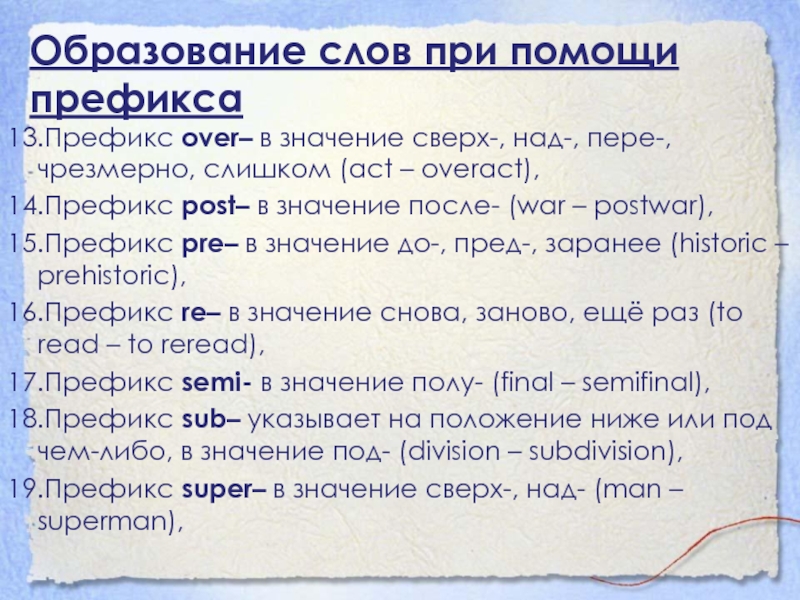
Слайд 30Приставки с отрицательным значением
1.Префиксы a–, ab- в значение без-, не- (moral – amoral),
2.Приставка
dis- придаёт значение отсутствия чего-то, не-, дис- или дез- (order – disorder, to organize – to disorganize).
3.Приставка in- придаёт противоположное значение без-, не- (active – inactive).
4.Приставка il- (перед I) придаёт противоположное значение не- (legal – illegal).
5.Приставка im- (перед p, m) придаёт противоположное значение не- (polite – impolite, mobile — immobile).
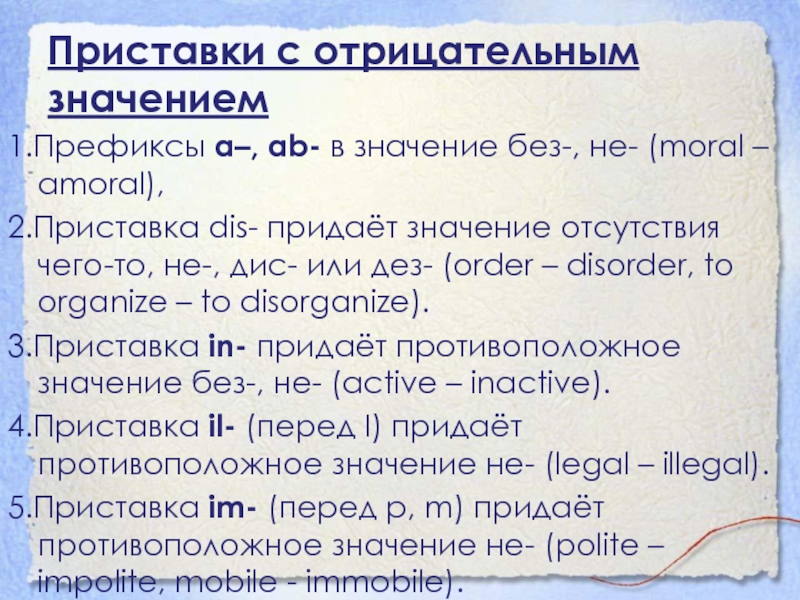
Слайд 31Приставки с отрицательным значением
6.Приставка ir- (перед r) придаёт противоположное значение не- (responsible –
irresponsible).
7.Приставка mis- придаёт значение неправильно, плохо, не- (use – misuse).
8.Приставка non- означает отрицание или отсутствие, не- (existent – nonexistent).
9.Приставка un- придаёт противоположное значение не- (happy – unhappy).
10.Приставка under- придаёт противоположное значение не-, недо-, под- (production – underproduction).
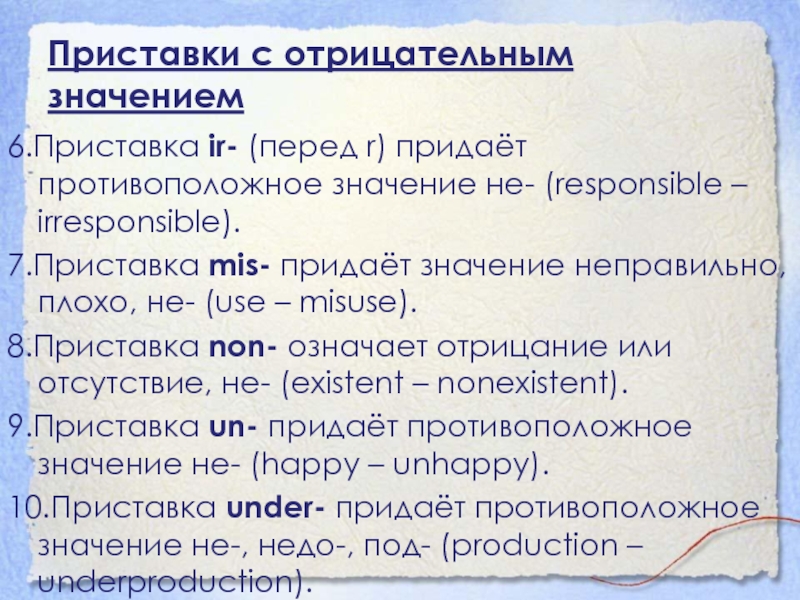
Слайд 32Тема «Словообразование»
в УМК «Spotlight-7»
(Система упражнений)
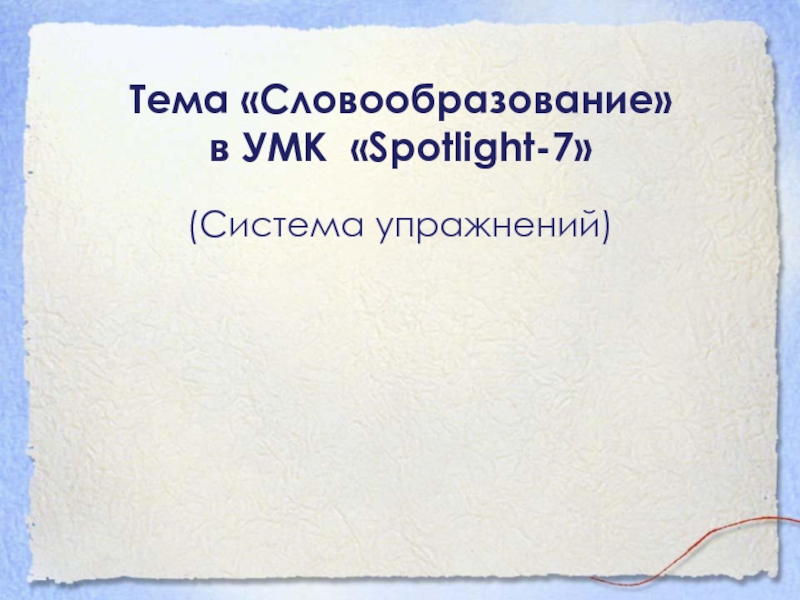
Слайд 33Модуль 1, №3, с.8
Read the rule: We form adverbs from adjectives
by adding – ly
Read and compare:
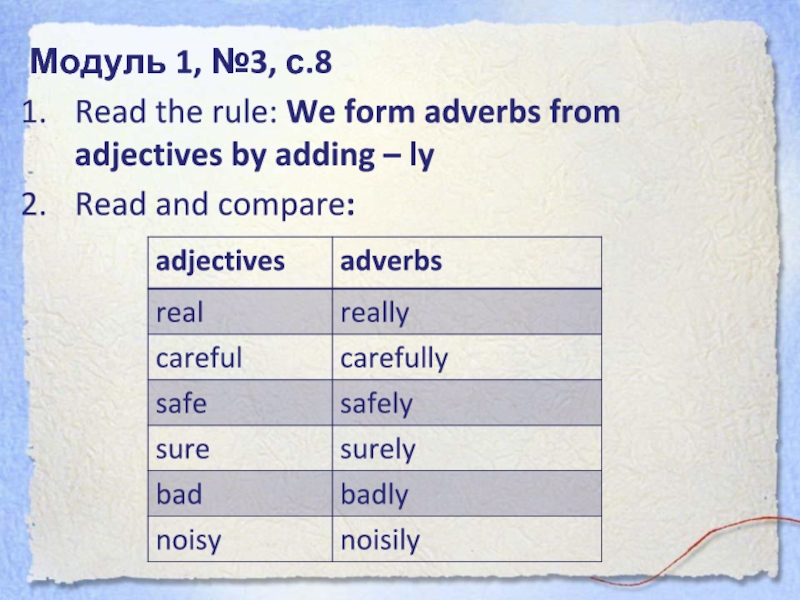
Слайд 34Модуль 1, №3, с.8
3. Find and read out the sentences with
adverbs in exercises 1 and 2, p. 8
Keys: properly, really, probably
4. Form adverbs:
5. Make sentences using these adverbs.
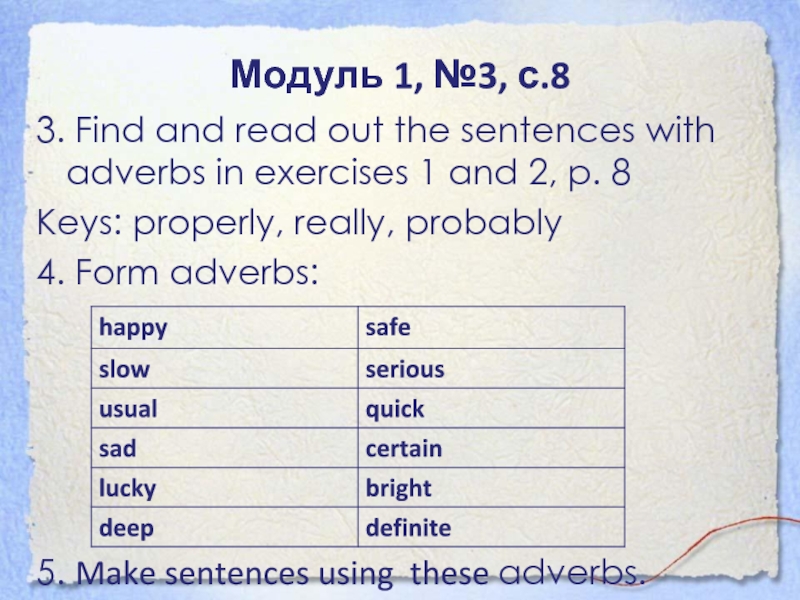
Слайд 35Модуль 4, №5, с.42
Read the rule: We can use -able, -ble,
-ent to form adjectives from verbs.
Read and compare:
3. Translate. Make sentences with these words.
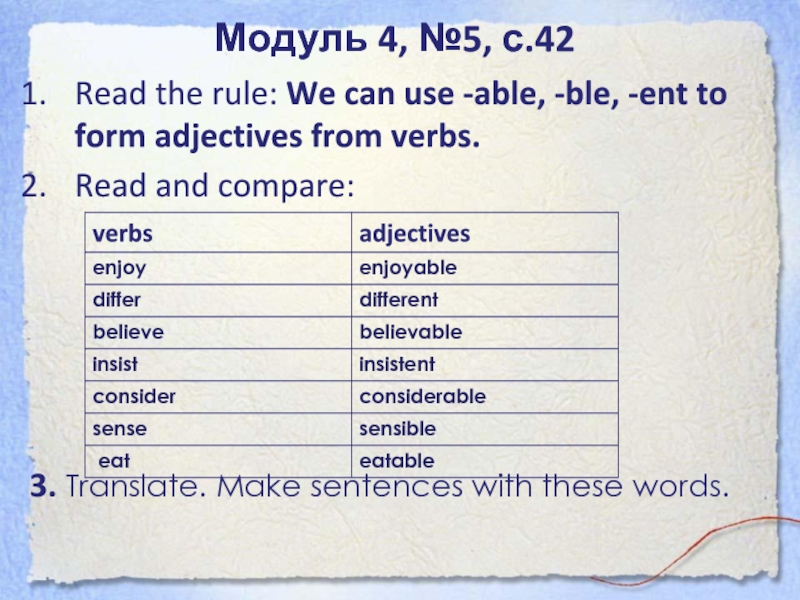
Слайд 36Модуль 6, №5, с. 61
1. Read the rule: we use un-,
il-, im-, in-, ir- to form opposite adjectives.
2. Read and compare:
3. Find and read out the sentence with such adjective in the article.
4. Form opposite adjectives: № 5, p. 61
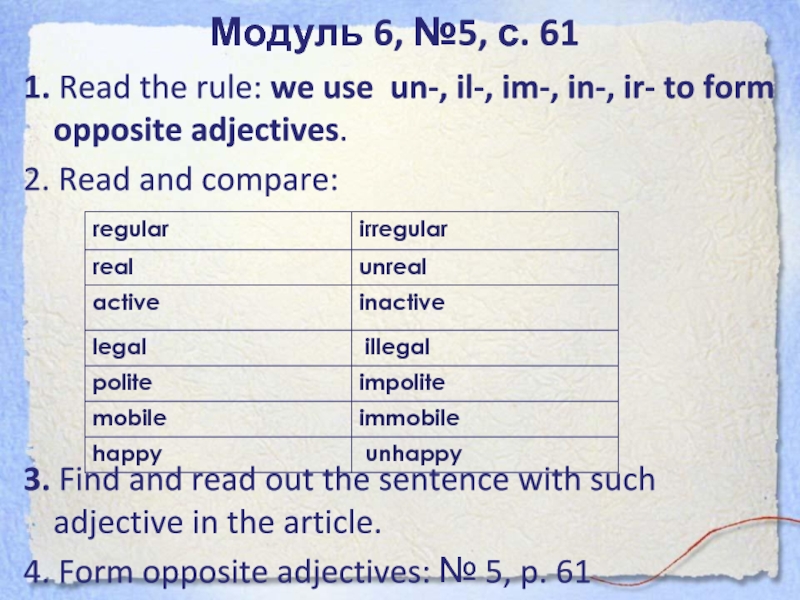
Слайд 37Модуль 8, №4, с. 82
Read the rule: we use –en at
the end of some adjectives to form verbs.
Read and compare:
Form verbs from the adjectives: № 4, p. 82
Make the sentences with these words.
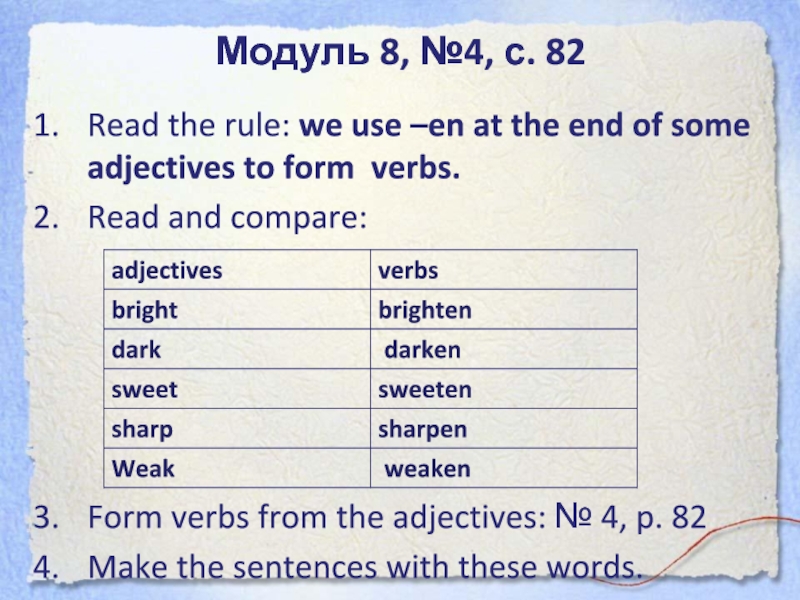
Слайд 38Модуль 10, №5, с. 101
1.Read the rule: we use –ive, -ative
to form adjectives from some verbs.
2. Read and compare:
3. Form adjectives from verbs 1-7. Make sentences using them.
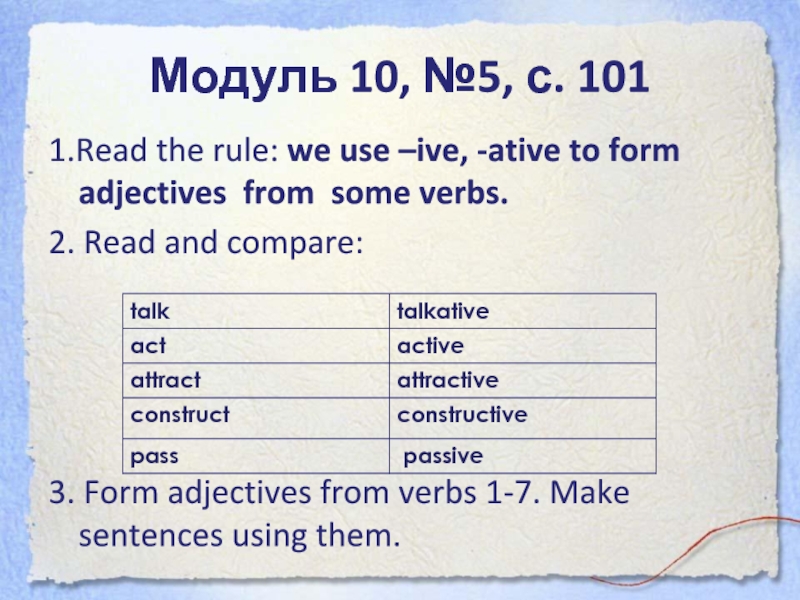
Слайд 39Ресурсы
Словообразование в английском языке. Word Formation in English
http://ped-kopilka.ru/blogs/olga-ivanovna-kabanova/slovobrazovanie-v-angliiskom-jazyke-word-formation-in-english.html
Английский язык. 7 класс:
учеб. для общеобразоват. организаций/[ Ю.Е.Ваулина, Д.Дули, О.Е.Подоляко, В.Эванс]. – 9 –е изд. – М.: Express Publishing: Просвещение, 2018. – 152 стр.: (Английский в фокусе). – ISBN 978-5-09-054976-9
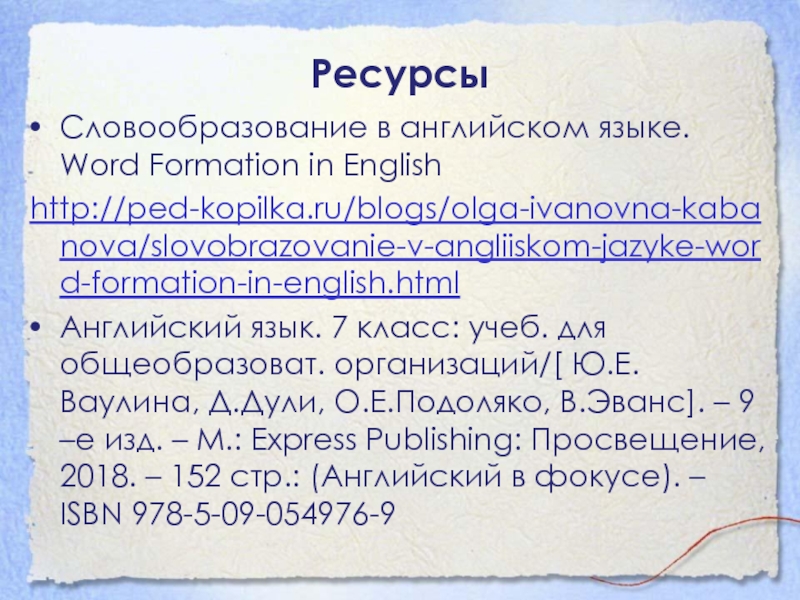
- WORD FORMATION.
- СЛОВООБРАЗОВАНИЕ.
« Введение в учебники раздела, посвященного словообразованию, обусловлено, с одной стороны сложностью и, соответственно, актуальностью этого материала, а с другой стороны, требованиями Единого Государственного Экзамена».
- « Введение в учебники раздела, посвященного словообразованию, обусловлено, с одной стороны сложностью и, соответственно, актуальностью этого материала, а с другой стороны, требованиями Единого Государственного Экзамена».
- О.В. Афанасьева
- И.В. Михеева
- Журнал «Иностранные языки в школе»
- Специальный выпуск.
О значении многих слов в английском языке можно догадаться по составу слова. Хорошее значение приставок и суффиксов дает вам возможность понимать без словаря значение большого количества незнакомых слов, образованных от знакомого корня.
- О значении многих слов в английском языке можно догадаться по составу слова. Хорошее значение приставок и суффиксов дает вам возможность понимать без словаря значение большого количества незнакомых слов, образованных от знакомого корня.
- Помните, что приставки изменяют значение слова, не меняя при этом части речи.
|
|
|
|
|
|
Будьте внимательны!!! Иногда начало слова похоже на приставку, но это не приставка, например: important.
- Будьте внимательны!!! Иногда начало слова похоже на приставку, но это не приставка, например: important.
- Суффиксы покажут вам, к какой части речи относится слово и что оно обозначает.
|
|
|
|
|
|
Но суффикс –er не всегда имеет значение лица, производящего действие, например: a letter- письмо, a father-отец, a mother- мать.
- Но суффикс –er не всегда имеет значение лица, производящего действие, например: a letter- письмо, a father-отец, a mother- мать.
|
|
|
|
|
|
|
|
|
|
|
|
|
|
|
|
|
|
|
|
|
|
|
|
|
|
|
|
|
|
|
|
|
|
|
|
В русском языке этим существительным соответствуют слова, оканчивающие на -ния, -тия, -ция, -ба, -ство, -ость.
- В русском языке этим существительным соответствуют слова, оканчивающие на -ния, -тия, -ция, -ба, -ство, -ость.
|
|
|
|
|
|
|
|
|
|
|
|
|
|
|
|
|
|
|
|
|
|
|
|
В некоторых случаях прилагательные с суффиксами –ic, -ical переводятся на русский язык одинаково, например:
- В некоторых случаях прилагательные с суффиксами –ic, -ical переводятся на русский язык одинаково, например:
- artistic, artistical- артистический
- astronomic, astronomical- астрономический
- tropic, tropical- тропический
- В других случаях такие прилагательные имеют различные оттенки значений, например:
- historic- важный для истории
- economic- экономический
- historical- исторический
- economical- экономный
|
|
|
|
|
|
Однако, не все слова, оканчивающиеся на –ly, являются наречиями. Некоторые прилагательные также имеют суффикс –ly, например: friendly- дружеский, lively- живой, lonely-одинокий, silly- глупый.
- Однако, не все слова, оканчивающиеся на –ly, являются наречиями. Некоторые прилагательные также имеют суффикс –ly, например: friendly- дружеский, lively- живой, lonely-одинокий, silly- глупый.
- Очень часто вы можете встретить слова, которые пишутся и произносятся одинаково, но являются различными частями речи. Чтобы правильно понять смысл предложения с таким словом, необходимо обратиться к структуре предложения.
- Сравните:
- Нer work is always neat. – Ее работа всегда аккуратна.
- I work regularly. – Я работаю систематически.
Совпадение форм особенно часто встречается у существительных и глаголов.
- Совпадение форм особенно часто встречается у существительных и глаголов.
- A note- запись. To note- записывать.
- A start- начало. To start- начинать.
- A support- поддержка. To support- поддерживать.
- Совпадение форм также встречается у прилагательных и глаголов:
- Own- собственный. To own- обладать.
- Clean- чистый. To clean- чистить.
Если перед прилагательными ты увидишь определенный артикль, то в этом случае прилагательные употребляются в значении существительного:
- Если перед прилагательными ты увидишь определенный артикль, то в этом случае прилагательные употребляются в значении существительного:
- The needy- нуждающиеся.
- The lonely- одинокие.
- The English- англичане.
- В английском очень много сложных слов (образованных путем соединения двух слов в одно). О значении таких слов можно догадаться по значению отдельных слов, входящих в их состав. Например:
- Newspaper-газета(news-новости + paper
- бумага), postcard-открытка(post-почта +
- card-карточка), seaside-побережье, motorbike-
- мопед.
В сложных существительных ударение обычно падает на первое слово, входящее в его состав. Сложные прилагательные обычно имеют двойное ударение.
- В сложных существительных ударение обычно падает на первое слово, входящее в его состав. Сложные прилагательные обычно имеют двойное ударение.
The perfect friend.
- Because … is one of the few kinds of relationship we have control over, it is an … area of research for sociologists. Although we can’t usually choose our …, bosses or …, we can choose our friends. But how do we choose them, and why is it that we find some people’s … more … than others? We are all looking for similar qualities in our friends, such as … , a good sense of humour and … . However, what each of us means by a’good sense of humour’, for example, is … .We are all unique, and so the perfect friend for one person may seem a little … to someone else!
- Friend
- Interest
- Relate
- Teach
- Person
- Attract
- Honest
- Kind
- Differ
- Bore
It is getting hotter!
- There seems to be little doubt that … warming is a real phenomenon. Temperatures are rising in many places … and … farmiand is being lost as sea levels rise due to melting of the polar ice. … disagree, though about whether this … change is being caused by human actions or whether is has other … causes. One explanation is the greenhouse effect. This is where … in the atmosphere traps the sun’s rays, like a giant greenhouse. While nobody claims that releasing chemical into the atmosphere can be …, not everyone is convinced that all the temperature change is due to … activity. It is an important question, because a … can only be found once we understand exactly what is causing the problem.
- Globe,
- world,
- value,
- science,
- environment,
- nature,
- pollute,
- harm,
- industry,
- solve.
The language of clothes.
- We don’t only choose clothes to make us look … we also use them to tell the world about our … . The clothes we wear and our … as a whole give other people … information about what we think and how we feel. If we feel …, we usually wear … clothes and if we feel depressed, we sometimes put on dark clothes. But why do … wear black so …? This is unlikely to be the case. It is probably just because it is … to wear black.
- Attract,
- person,
- appear,
- use,
- cheer,
- colour,
- teenage,
- frequent,
- misery,
- fashion.
Информационные ресурсы:
- 1. «Happy English для 7 класса» В.П. Кузовлев, Н.М. Лапа и другие.
- 2. Тестовые задания по разделу «Use of English» Н.Б. Донецкая.
1
WORD FORMATION
2
СЛОВООБРАЗОВАНИЕ (WORD-BUILDING) В английском языке имеется несколько способов словообразования: ) 1) конверсия (образование новых слов без изменения их написания и произношения) 2) словосложение (образование нового слова путем сложения двух слов в одно) 3) изменение ударения в слове (и получение нового слова другой части речи). 4) аффиксация (прибавление к корню суффикса или префикса)
3
Словообразование с помощью аффиксации. Prefixes Meaning Examples anti -= againstantisocial bi -= twobiannual co -= withco-driver ex-= previous, formerex-husband inter-= betweeninternational mis-= done wrongly or badlymisbehave mono-= onemonorail multi-=manymultinational non-= notnon-fiction out-= more, betteroutnumber
4
Словообразование с помощью аффиксации. Prefixes Meaning Examples over-= done to a great extentoverwork post= afterpostdate pre-= beforeprehistoric pro-= in favour ofpro-government re-= againredecorate semi-= halfsemi-final sub-= under, lesssubmarine super-=big, moresuperhuman trans-= travel from one side, to anothertranscontinental under-= not enoughundercooked
5
To express opposite meaning: de- defrost, decompose dis- dishonest, dislike in- indirect, independent But: il- (before l ) illogical im- (before m, p) immoral, impractical ir- (before r) irresponsible But: unreliable, unreasonable non- non-smoke, non-stop un- unacceptable, unemployed Словообразование с помощью аффиксации.
6
Ex. 1. Переведите следующие слова, выделите в них суффиксы и префиксы Untrue, prehistoric, ultramodern, postwar, ex-champion, anti-body, decompose, decode, deform, depart, discover, disappearance, reread, reconstruct, coauthor, unequal, misunderstand, undress, disarm, anti-fascist, cooperation, co-existence, interaction, superhuman, ultra-violet.
7
Suffixes Nouns referring to people Verb + er/or/ar Verb + er/or/ar teach-teacher; sail-sailor; Noun/ verb/ adjective ist Noun/ verb/ adjective + ist motor-motorist; tour-tourist; Verb ant/ ent Verb + ant/ ent study-student; Noun +an/ ian Noun + an/ ian republic-republican; library- librarian
8
Nouns formed from verbs -age pack- package -al refuse-refusal -ance accept-acceptance -ation realize-realization -ence differ-difference -ion revise-revision -ment enjoy-enjoyment -sion comprehend-comprehension -sis hypnotise -hypnosis -tion prescribe- prescription Suffixes
9
Nouns formed from adjectives -ance important-importance -cy vacant-vacancy -ence competent-competence -ion desolate-desolation -ness lonely-loneliness -ity formal-formality -ty loyal-loyalty -y modest-modesty Suffixes
10
Adjectives formed from nouns -ous fame-famous -al addition-additional -ic hero-heroic -ive expense-expensive -ful (with) care-careful -less (without) care-careless -y health-healthy -ly friend-friendly Suffixes
11
Adjectives formed from verbs -able like-likable -ible defend-defensible -ive conclude-conclusive Verbs formed from adjectives -en light-lighten -ise legal-legalise Suffixes
12
Ex. 2. Определите, к какой части речи относятся следующие слова. Переведите их: Achievement — achieve, resistance — resistant, assistance — assist — assistant, celebration — celebrate, difference — different, city — citizen, nation — national — nationality, measure — measurement, develop — development, act — active — activity, contain — container, discover — discovery — discoverer, literature — literary, graduate — graduation — undergraduate — post-graduate, educate — education, progress — progressive, act — action — activity — active, govern — governor — government.
13
Ex. З. Образуйте от данных глаголов существительные с по мощью суффикса -ег или -or. Переведите на русский язык: to lead, to write, to read, to visit, to speak, to sleep, to act, to direct, to conduct, to drive, to fight, to mine, to report, to sing, to skate, to swim, to teach, to travel, to sail, to invent, to found, to compose.
14
Образуйте от данных глаголов существительные с помощью суффикса -ment. Переведите на русский язык: Develop, achieve, move, arrange, treat, state, improve, agree, equip, govern, require, measure, announce, pave. Образуйте прилагательные с помощью суффиксов -ful и -less, переведите их на русский язык: Beauty, thank, hope, doubt, care, aim, use, shape, fruit, power, thought, harm, colour.
15
Образуйте прилагательные с помощью суффиксов -able, -ible, переведите их на русский язык: Change, convert, prevent, break, compare, desire, profit, read, comfort, respect, expect Образуйте наречия с помощью суффикса -ly и переведите их Bad, first, part, quick, strong, short, silent, rapid, wide, extreme, cruel, kind, happy
Слайд 1
Описание слайда:
English Word Formation
Deny A. Kwary http://www.kwary.net Airlanga University
Слайд 2
Описание слайда:
Types of Word Formation
Compounding
Prefixation
Suffixation
Conversion
Clipping
Blends
Backformation
Acronyms
Onomatopoeia
Eponyms
Toponyms
Слайд 3
Описание слайда:
1. Compounding
Definition: Two or more words joined together to form a new word.
Examples:
Home + work homework
Pick + pocket pickpocket
The meaning of a compound is not always the sum of the meanings of its parts.
Types of compounds:
Compound nouns
Compound verbs
Compound adjectives
Слайд 4
Слайд 5
Слайд 6
Слайд 7
Описание слайда:
2. Prefixation
Class-changing prefixes:
a- asleep V to Adj
be- bewitch N to V
en- enslave N to V
Class-maintaining prefixes:
in- indefinite Adj to Adj
fore- foreman N to N
Etc.
Слайд 8
Описание слайда:
3. Suffixation
Suffixes forming Nouns
N from N: -dom kingdom
N from V: -ee employee
N from Adj: -ce dependence
Suffixes forming Verbs
V from N: -ify beautify
V from Adj: -en shorten
Suffixes forming adjectives
Adj from N: -al educational
Adj from V: -able understandable
Adj from Adj: -ish greenish
Suffixes forming Adverbs: -ly, -ward, and –wise.
Слайд 9
Описание слайда:
4. Conversion
Definition: Assigning an already existing word to a new syntactic category.
Types of Conversion
Verb to Noun: to hit a hit
Adj to N: a final game a final
N to V: a sign to sign
Adj to V: an empty box to empty
Слайд 10
Описание слайда:
5. Clipping
Definition: Shortening a polysyllabic word by deleting one or more syllables
Examples:
Gasoline Gas
Hamburger Burger
Слайд 11
Описание слайда:
6. Blends
Definition: Similar to compounds, but parts of the words are deleted.
Examples:
Motor + hotel Motel
Breakfast + lunch Brunch
Wireless + Fidelity
Sheep + goat
Слайд 12
Описание слайда:
7. Back-formations
Definition: Creative reduction due to incorrect morphological analysis.
Examples:
editor (1649)
edit (1791)
television (1907)
televise (1927)
Paramedical (1921)
paramedic (1967)
Слайд 13
Описание слайда:
8. Acronyms
Definition: Words derived from the initial letters of several words and use them as a new word
Examples:
Strengths, Weaknesses, Opportunities and Treats
SWOT
Self-contained underwater breathing apparatus
SCUBA
Слайд 14
Описание слайда:
9. Onomatopoeia
Definition: Words created to sound like the thing that they name.
Слайд 15
Описание слайда:
10. Eponyms
Definition: a person after whom a discovery, invention, place, etc., is named.
Examples:
Celcius (Anders Celcius)
Cook Islands (James Cook)
Слайд 16
Описание слайда:
11. Toponyms
Definition: a place name, especially one derived from a topographical feature.
Examples:
Montana (‘mountains’ in Spanish)
Mississippi (‘big river’ in Chippewa)
Слайд 17
Download

Skip this Video
Loading SlideShow in 5 Seconds..
WORD FORMATION PowerPoint Presentation
Download Presentation
WORD FORMATION
— — — — — — — — — — — — — — — — — — — — — — — — — — — E N D — — — — — — — — — — — — — — — — — — — — — — — — — — —
Presentation Transcript
-
WORD FORMATION New words are formed in three main ways in English, they are: Affixation Compounding Conversion
-
AFFIXATION • I. PREFIX • Characteristics: Generally they do not alter the word class of the base.The arenormally written together with the base as a single word.Main stress falls normally on the base.They can be grouped according to their meaning. • 1. Negative Prefixes • un- : unfair, unadorned, unfortunately • non- : non-conformist, non-existent, non-verb • in- : invisible • il : illogical • im : impossible • ir : irresponsible, irregular • dis : disloyal, disobey, dislike, disagree • a (n) : amoral, atheist • 2. Reversible Prefixes • un- : undo, undress, unhorse • de- : defrost, depoliticize • dis- : discouraging, disheartened
-
3. Pejorative Prefixes • mis- : mishear, misconduct, misunderstanding • mal- : malfunction, maltreat, malpractice • pseudo- : pseudo-scientific, pseudo-classicism • 4. Prefixes of degree and size • arch- : archduke, archenemy • super- : supermarket, superman • out- : outlive, outdo, outrun, outstanding • sur- : surchange, surplus • over- : overdo, overall • under- : undertook, underpressure • hyper- : hyperactive, hypersensitive • 5. Prefixes of attitude • co- : cooperative, cooperation, coordination • counter- : counter-attack • anti/pro- : anti-democracy, pro-democarcy, anti-climaxs
-
6. Locative Prefixes • sub- : subway, subconcious, subdivide • inter- : international, interplay • trans- : transplant, transmusi • 7. Prefixes of time and order • fore- : foretell, foreman, forewarn • pre/post- : pre-historial, post-historial • ex- : ex-minister, ex-wife • re- : rebuild, relocation • 8. Number Prefixes • uni/mono- : unilateral, monosyllable, monochrome • bi/di- : bifocal, bilingual, dichotomy • multi- : multiculture, multiracial • 9. Conversion Prefixes • be- : bewitch, befriend • en/em- : endanger, empower • a- : afloat
-
II. SUFFIX • Characteristics: They normally alter the word type of the base.Suffixes rarely have a distinct meaning on their own.The change the word into which they are included into another part of speech.The can be classified according to the speech part they form, or according to the type of base the are added to. • 1. Noun Suffixes • a. Occupational • -eer : engineer • -ster : gangster, gamester • -er : banker, runner • b. Diminutive and Feminine • -let : booklet, piglet • -ette : cigarette, kitchenette • -ess : hostess, stewardess • c. Status, Domain (abstract) • -hood : brotherhood, likelihood • -ship : friendship, championship • -dom : freedom
-
d. Quantity • -ful : handful, spoonful, helpful • -ship : friendship, championship • -dom : freedom • 2. Noun/Adjective Suffixes • -ese : Japanese • -ist : novelist, typist, pianist • -ism : communism, imperalism • 3. De-verbal Suffixes • -ant : applicant, occupant • -ion/-ation : operation, exploration • -ment : arrangement, argument, amusement • -al : approval, refusal • -ing : swimming, living • -age : package, shortage, heritage
-
4. De-adjectival Suffixes • -ness : goodness, happiness, selfishness • -able/-al/-ity : readable, sentimental, sentimentality • 5. Verb Suffixes • -ify : identify • -ize : memorize, organize, scandalize • -en : shorten, sadden, blacken • 6. Adjective Suffixes • -able : readable, drinkable • -ful : beautiful, pletiful • -en : wooden, leaden • -ic : Germanic, specific • -ish : foolish, snobbish • -less : helpless, hopeless • 7. Adverb Suffixes • -ly : happily, freely, instantly • -wards : onwards, eastwards • -wise : clockwise
-
COMPOUNDING Definition : Two or more word joined together to form a new word, separately or with a hypen. For example: — Home + Work : homework — Pick + Pocket : pickpocket — Fast + Food : fast-food — Baby + Sitter : baby-sitter NOTE: The meaning of a compound is not always the sum of the meanings of its part. e.x: — Coconut oil : oil made from coconut — Baby oil : an oil for babies, NOT oil made from babies
-
CONVERSION Definition: Conversion is derivational process whereby an item changes its word-class Verb to Noun verb will be noun by adding: — er behind it with the meaning THE DOER OF THE VERB — the before its past participle form with the meaning THE VICTIM OF THE VERB e.x: The kicked kicks kicker with a kick Noun to Verb Noun will be verb with the meaning GIVE THE NOUN e.x: I’ll flower this table My sister always waters all of flowers in the garden
-
3. Noun to Adjective Noun becomes adjective by adding suffix –en, as follow: Wood — Wooden Gold — Golden e.x: SitiNurhalizah has golden voice These two areas are connected by a wooden bridge Adjective to Noun Adjective becomes noun by using THE before it and it is singular in form but stands for plural e.x: The tall are easy to steal mangoes The poor mustn’t be avoided Adjective to Verb Adjective becomes verb by adding –ing, –ed, or nothing with the meaning TO MAKE ADJECTIVE e.x: The background must be blacked The driver is slowing the car’s speed Open the door, please!
COMPOSITION AND MINOR TYPES
OF WORD FORMATION
Изображение слайда
2
Слайд 2: TYPES OF WORD FORMATION
MAIN TYPES
1. Derivation
2. Composition
3. Conversion
MINOR TYPES
1. Shortening
2. Sound interchange
3. Stress interchange
Sound imitation
Abbreviation
Blending
Back-formation
Изображение слайда
3
Слайд 3: TYPES OF WORD FORMATION
MAIN TYPES
MINOR TYPES
1. Derivation
2. Composition
3. Conversion
1. Shortening
2. Sound interchange
3. Stress interchange
4. Sound imitation
5. Abbreviation
6. Blending
7. Back-formation
Изображение слайда
4
Слайд 4: MAIN TYPES
DERIVATION
COMPOSITION
CONVERTIAN
is a kind of word-formation when a new word is formed by adding a derivational morpheme (usually suffix or prefix) to the root.
This type of word-building, in which new words are produced by combining two or more stems
is the process of coining a new word in a different part of speech without adding any derivative element, so that the basic form both of the original and derived words are homonymous
Care ful, l ove ly, help less, over time
Dis respect, un believable
Mis understand ing
blackbird, shop-window, sunflower, bedroom, tallboy
A work-to work
Pale( adj )- to pale
A catch – to catch
Изображение слайда
5
Слайд 5: Minor Types of Word Formation
SHORTENING
dub-double, fridge, frig – refrigerator, vac — vacuum cleaner, mike – microscope, trank – tranquilizer. Shortening may take any part of a word usually a single syllable and throw away the rest: pram, lab, phone – telephone, plane – airplane, flu – influence.
Изображение слайда
Clipping (shortening)
The shortening of words consists of the reduction of a word to one of its parts, as a result of which the new form is used as an independent lexical unit.
This type of word-formation is in English highly productive.
a. Final clipping – the beginning of the prototype is retained. E.g. ad, advert < advertisement, memo < memorandum, lab < laboratory, gym < gymnasium, vac < vacuum cleaner. b. Initial clipping – the final part is retained. E.g. chute < parachute, phone < telephone, copter < helicopter, plane < aeroplane. c. The middle is retained. E.g. Liz < Elizabeth, flu < influenza, tec < detective. d. The middle is left. E.g. fancy < fantasy, bionics < binoculars, maths < mathematics, ag’st < against.
Изображение слайда
7
Слайд 7: Minor Types of Word Building
1. SHORTENNING (CLIPPING)
is a process of creating of a new word by shortening of the original polysyllabic word (prototype).
According to what part is cut off we distinguish:
final – doc (doctor),
initial – net (Internet)
medial clipping – poli-sci (political science).
Изображение слайда
8
Слайд 8: Minor Types of Word Formation
2. SOUND INTERCHANGE
is an opposition in which words or word forms are differentiated due to an alteration in the phonemic composition of the root. The process is not active in the language at present, and oppositions survive in the vocabulary only as remnants of previous stages.
food – feed, speak – speech, woman-women
Изображение слайда
9
Слайд 9: Minor Types of Word Formation
3. STRESS INTERCHANGE
Some otherwise homographic, mostly disyllabic nouns and verbs of Romanic origin have a distinctive stress pattern.
‘ conduct n — ‘behaviour’
con’duct v — ‘to lead or guide (in a formal way)’
ADJ. VERBS
‘absent – to ab’sent ;
‘frequent — to fre’quent ;
‘perfect – to per’fect ;
‘abstract – to ab’stract etc.
Изображение слайда
10
Слайд 10: Minor Types of Word Formation
4. SOUND IMITATION
is the naming of an action or thing by a more or less exact reproduction of a sound associated with it.
bubble or splash — the sound of water
clink, tinkle- the noise of metallic things
buzz, croak, crow, moo, mew, neigh, purr, roar — sounds produced by animals, birds and insects
giggle, murmur, whisper — sounds produced by human beings in the process of communication or in expressing their feelings
etc.
Изображение слайда
11
Слайд 11: Minor Types of Word Formation
5. ABBREVIATION
is the process and the result of forming a word out of the initial elements (letters, morphemes) of a word combination.
Изображение слайда
12
Слайд 12: Types of abbreviation
1) Acronym is a written form which reads as an ordinary English word
NATO — the North Atlantic Treaty Organization
laser — light amplification by stimulated emission radiation
2) Initial abbreviation with the alphabetical reading, i.e. pronounced as a series of letters.
B.B.C. [‘ bi:’bi:’si :] — the British Broadcasting Corporation
3) Shortened form of a written word or phrase used in a text in place of the whole for economy of space and effort. In oral speech the unabbreviated words are pronounced
govt for government,
wd for word
N.Y. for New York State
4) Latin abbreviations which sometimes are not read as Latin words but substituted by their English equivalents.
e.g. (Lat exempli gratia) — for example;
Изображение слайда
13
Слайд 13: Minor Types of Word Formation
6. BLENDING
— is combining parts of two words to form one.
— refer words consisting of shortened parts of two derivational bases: the first constituent part of a blend represents a base whose final part is curtailed, the second part of it is made of a base whose initial part is missing.
smog = sm ( oke ) + (f) og.
brunch = breakfast + lunch
dancercise = dance + exercise.
Изображение слайда
14
Последний слайд презентации: Word-formation: Minor Types of Word Formation
7. BACK-FORMATION
Изображение слайда
-
Скачать презентацию (0.25 Мб)
-
163 загрузки -
3.7 оценка
Ваша оценка презентации
Оцените презентацию по шкале от 1 до 5 баллов
- 1
- 2
- 3
- 4
- 5
Комментарии
Добавить свой комментарий
Аннотация к презентации
Посмотреть и скачать презентацию по теме «Modern English Word Formation» по иностранным языкам, включающую в себя 26 слайдов. Скачать файл презентации 0.25 Мб. Средняя оценка: 3.7 балла из 5. Большой выбор учебных powerpoint презентаций по иностранным языкам
-
Формат
pptx (powerpoint)
-
Количество слайдов
26
-
Слова
-
Конспект
Отсутствует
Содержание
-
Слайд 1
Modern
English
Word
Formation -
Слайд 2
The aim of this work is to teach students to be word-conscious, to be able to guessthe meaning of words they come across from the meaning of morphemes, to beable to recognize the origin of this or that lexical unit.
The task of the work is to show the ways of word building, i.e. affixation,suffixation, compounds, statives, vowel and consonant alternations and conversion.
Topical interest. This work is of topical interest because English is a livinggrowing language. The system of its sounds is subjected to various changes, thewords and word combinations undergo changes. The most noticible and mostappreciable transformations occur in words that form part of English, that is in itsvocabulary. -
Слайд 3
It is a matter of common knowledge that the vocabulary of any language is never stable, but is constantly changing, growing and decaying. The changes in the vocabulary of the language are due both to linguistic and extra-linguistic causes, which are determined by the social nature of the language.The intense development of science and technology has lately given birth to a great number of new words such as ‘computer’, ‘cyclotron’,’radar’, ‘psycholinguistics’, etc.; the conquest and research of outer spacestarted by the Soviet people contributed words like ‘sputnik’,‘lunokhod’,’babymoon’,’moon-car’,’spaceship’. It is significant that the suffix –nik occurring in the noun‘sputnik’ is freely applied to new words of various kinds, e.g. ‘flopnik’,’mousenik’, ‘woofnik’,etc.
-
Слайд 4
The ways in which new words are formed, and the factors which govern their acceptance into the language, are generally taken very much for grantedby the average speaker to understand a word, it is necessary to know how it is constructed, whether it is simple or complex, that is whether ornot it can be broken down into two or more parts.We are able to use a word which is new to us when we find out what object or notion it denotes. Somewords, of course, are more understandable than others.
-
Слайд 5
Unfathomable =negative prefix + adjective forming suffix =cannot be fathomed.Knowing the pattern, we can easily guess the meaning of a word although there are lots of other words which look similar, for instance, unfashionable and unfavourable for which this analysis will not work. We accept as quite natural the fact that although we can use the verbs ‘to pipe’, ‘to drum’ and ‘to trumpet’, we cannot use the verbs ‘to piano’ and ‘to violin’.
-
Слайд 6
An unabridged English dictionary contains about 600 000 words
The bad news is that even if you have an
excellent vocabulary, you know only a
small percentage of those words. The good
news, however, is that you can increase
your vocabulary throughout your life. The
even better news is that once you have
learnt a new word, it is yours for life. It will
always be stored away, ready to be recalled
the next time you have a conversation or
write a letter or composition. -
Слайд 7
Some words have many different meanings.
Let’s take, for example, the
word ‘titanic’ in the following
sentences. 1. The Titanic sank in
the North Atlantic on an April
night in 1912 after hitting an
iceberg. 2. The enemies were
locked in a titanic struggle. You
can tell from the first sentence
that Titanic is a ship and from the
second sentence that ‘titanic’
means “having great size, force
or power. -
Слайд 8
Context clues can help us learn the meaning of a word. The context of a word is the sentence, the surrounding words, or the situation in whichthe word appears.There are several types of them.1. Definition or restatement is defined in the sentence ,e.g.We read a collection of fables, short stories that teach a lesson.2. The meaning of the word is made clear by the example, e.g.Bombay is a populous city; one way the Indian government hastried to ease the overcrowding there is to build a second Bombay.3. Comparison. e.g. Joseph has always been amiable – almost as friendly as his older brother Mark.( As introduces a comparison between Joseph’s disposition and that of his older brother.)4. Contrast. e.g. The mayor’s popularity, soared to its highest point,but the city council’s dropped to its nadir. ( A contrast is drawnbetween the highest point of the mayor’s popularity and the lowest point, the nadir, of the city council’s.
-
Слайд 9
Means of word-forming
English is a living, growing language; new words are
constantly being added. English words come from many
sources. Some come from the dead language Latin, and
others come from ancient Greek. Knowing the words and
parts of words borrowed from Latin and Greek can help us
understand the meaning of many English words. In general,
English words are of two kinds:
those that can be
analysed into smaller
parts:
untimelythose that cannot
time, face, feel -
Слайд 10
The words of the first kind, which can be divided, are made up of parts called
prefixes
roots
suffixes
They offer clues
to the meaning of the words.
A root
is the part of a word
that carries the basic meaning.
A prefix
is one or more syllables
placed in front
of the root to modify the meaning of the root
or to form a new word. -
Слайд 11
PREFIXES HAVE BROAD GENERAL MEANINGS LIKE‘NOT’, ‘UNDER’, ‘AGAINST’ AND ANY OF THEM MAY APPEARIN HUNDREDS OF DIFFERENT WORDS. BECAUSE PREFIXESOFTEN HAVE MORE THAN ONE MEANING, THEY CAN BE HARD TO INTERPRET.
The main function of prefixes
is to change
the lexical meaning of the same part of speech.
There are 51 prefixes in the system of Modern English word formation.
Prefixation -
Слайд 12
Suffixation
In Modern English, suffixation is mostly characteristic of noun and adjectiveformation, while prefixation is mostly typical of verb formation. The distinction alsorests on the role different types of meaning play in the semantic structure of thesuffix and the prefix. The part-of -speech meaning has a much greater significancein suffixes as compared to prefixes which possess it in a lesser degree.Due to it, a prefix may be confined to one part of speech as, for example,enslave,encage, unbutton ,or may function in more than one part of speech asover- inover kind, overfeed, overestimation.
Unlike prefixes, suffixes as a rule function in any one part of speech often forming
a derived stem of a different part of speech as compared with that of the base,e.g. careless — care; suitable — suit, etc. Furthermore, it is necessary to point outthat a suffix closely knit together with a base forms a fusion retaining less of itsindependence that a prefix which is as a general rule more independent semantically,e.g. reading- ‘the act of one who reads’; ‘ability to read’; andre-read — ‘to read again’. -
Слайд 13
There are two kinds of suffixes:
Grammatical Derivational
-s, -ed, -ing
-ly,-ence,ize,-hood
grammatical provide a grammatical signal of some kind but don’t greatlyalter the basic meaning of the word and those that, by being added, createnew words. The endingsare suffixesof the first kind. Grammatical suffixes are important in grammar, but in vocabulary we are more concerned with the second kind of suffixes –those that make new words – derivational suffixes. -
Слайд 14
Derivational suffixes can be classified according to the parts of speech.
Classification of suffixes
-
-
Слайд 16
Adjective suffixes
-
-
Слайд 18
Suffixes indicating smallness or lessening
-
Слайд 19
When speaking about the structure of words stems should
also be mentioned. The stem is the part of the word
which remains unchanged throughout the paradigm
of the word.Stems have not only the lexical meaning but
also grammatical meaning. They can be noun stems, adjective
stems and verb stems. Sometimes it is rather difficult to
distinguish between simple and derived words, especially in
the cases of phonetic borrowings from other languages and
of native languages with blocked morphemes, e.g. “cranberry”,
“absence”,etc.Roots
-
Слайд 20
Compound nouns are nouns built from two or more roots.
They often have one stress. The meaning of a compound
often differs from the meaning of its elements.
Compounding- is one of the productive types of word-formation in Modern English.
Compound words are inseparable vocabulary units.
They are formally and semantically dependent on the
constituent bases and the semantic relations between them
which mirror the relations between the motivating units.
The main types of compound nouns are as follows:Compounds
noun-stem+noun -stem
apple-tree, snowball, newspaper
adjective stem+ noun stem
blackbird, whitehorn, blackleg -
Слайд 21
Stonewall combinations
In Modern English there are lots of word combinations of the type price rise, wage freeze, steel helmet, sand castle.
Grammarians can’t come to the conclusion whether adjectives can be formed by means of conversion from nouns. -
Слайд 22
Abbreviations
The causes of shortening can be linguistic and extra-linguistic. Abbreviation doesn’t change the part-of-speech meaning.
Examples: prof=professor, to rev=to revolve, comfy=comfortable. -
Слайд 23
Such words as asleep, abed, ablaze, afraid, akin, alive have
been named adjectives, though they can’t
be attributes in a sentence, and though their meaning
doesn’t seem to be that of property. The a- means on,
in or at. Statives are invariable. They often show a
temporary state rather than a permanent one. They
most usually follow a link-verb (was asleep) or they
can be used like a participle, but they can’t go before
the noun they modify. In the sentence a stative is most
usually a predicative (he fell asleep).
The statives -
Слайд 24
Conversion, one of the principal ways of forming words in Modern
English is highly productive in replenishing the English word-stock
with new words. This term refers to the numerous cases of words
belonging to different parts of speech. This may be illustrated by
the following cases: work – to work; love – to love; paper –
to paper. As a rule we deal with simple words. There is a certain
difference on the morphological level between various parts of
speech, mostly between nouns and verbs. What serves a word-
building means? The answer is a paradigm. As it is a morphologi-
cal category, conversion can be described as a morphological
way of forming words.Conversion
-
Слайд 25
Blends are words formed from a word-group or two synonyms.
In blends two ways of word-building are combined: abbreviation
and composition. To form a blend we clip the end of the first
component and the beginning of the second component. As a
result we have a compound –shortened word. One of the first
blends in English was the word “smog” from two synonyms:
smoke and fog. Mostly blends are formed from a word-group:cinemadict
informecial
slimnastics
slanguist
dramedy
faction
medicare
socialite
acromania
chunnel
megalog
Blends -
Слайд 26
Cinemadict – cinema addict,informecial – informational commercialslimnastics – slimming gymnasticsslanguist – slang linguistacromania – acronym maniachunnel – channel, canalmegalog – magazine cataloguedramedy – drama comedyfaction – fact fiction – fiction based on real factsmedicare – medical caresocialite – social elite
Посмотреть все слайды
Сообщить об ошибке
Похожие презентации









Спасибо, что оценили презентацию.
Мы будем благодарны если вы поможете сделать сайт лучше и оставите отзыв или предложение по улучшению.
Добавить отзыв о сайте






























































